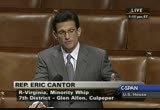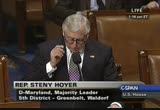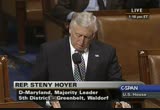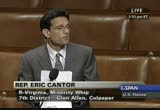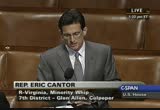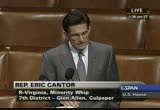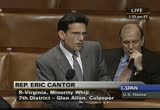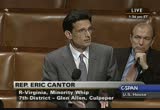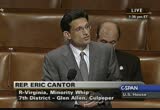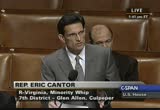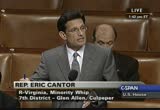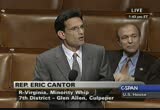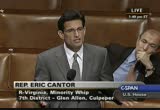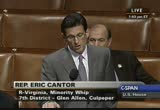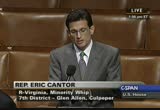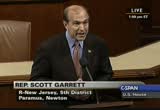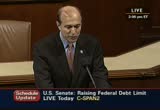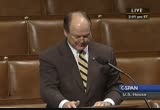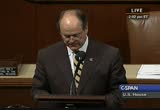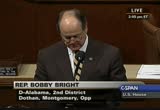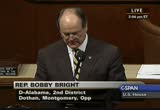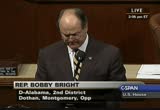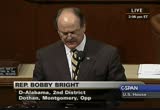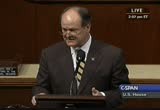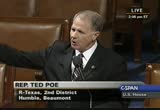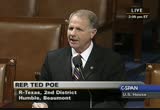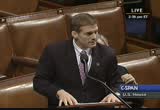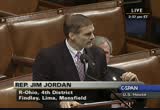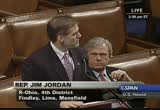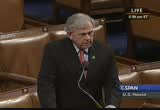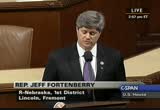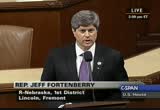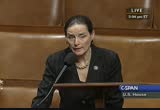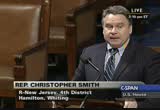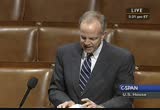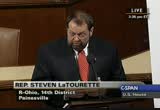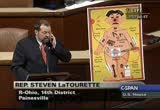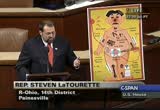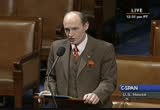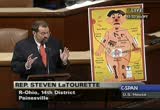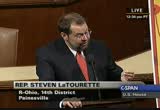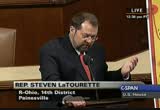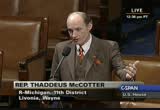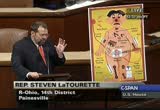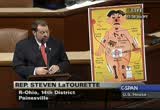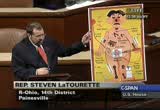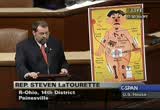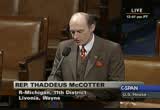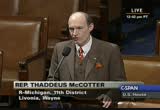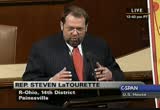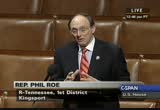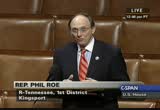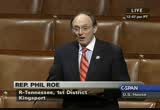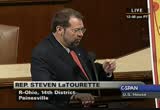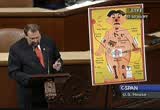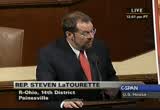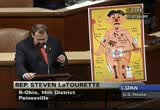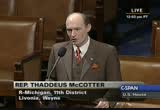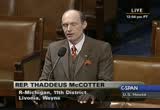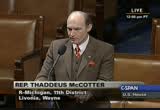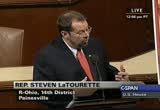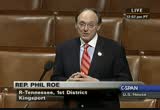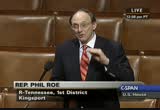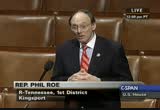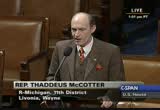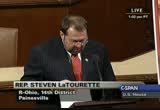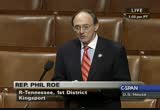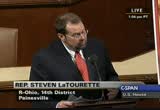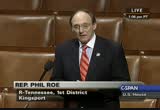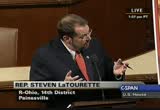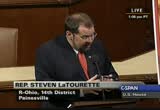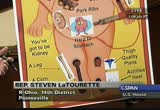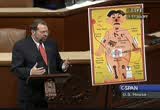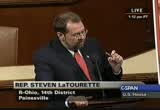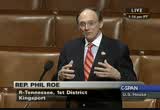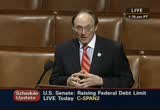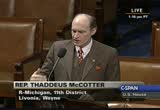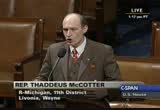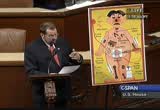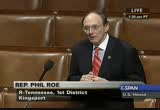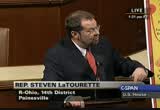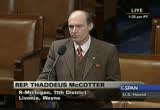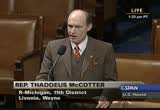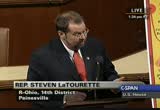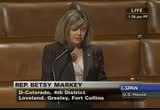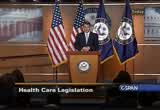tv U.S. House of Representatives CSPAN January 21, 2010 1:00pm-5:00pm EST
1:06 pm
1:07 pm
table. the unfinished business is the question on suspending the rules and passing house resolution 3250 by the -- which the clerk will report by title. the clerk: a bill to designate facility of the united states postal service located at 1210 west main street in riverhead, new york, as the private first class garfield m. langhorn post office building. the speaker pro tempore: the question is, will the house suspend the rules and pass the bill. so many as are in favor say aye. those opposed, no. in the opinion of the chair, 2/3 of those voting having responded in the affirmative, the rules are suspended, the bill is passed and without objection the motion to reconsider is laid on the table. the unfinished business is the question on suspending the rules and agreeing to house concurrent resolution 158 as amended which the clerk will report by title. the clerk: house concurrent resolution 158, early detection
1:08 pm
month for breast cancer and all forms of cancer. the speaker pro tempore: the question is, will the house suspend the rules and agree to the concurrent resolution as amended. those in favor say aye. those opposed, no. in the opinion of the chair, 2/3 of those voting having responded in the affirmative, the rules are suspended, the concurrent resolution is agreed to and without objection the motion to reconsider is laid on the table. for what purpose does the gentleman from virginia rise? mr. cantor: madam speaker, i ask to addss the house for one minute for therposes of inquiring about next week's schedule. the speaker pro tempore: without objection. mr. cantor: thank you, madam speaker. and i yield to the gentleman from maryland, the majority leader, for the purpose of announcing next week's schedule. mr. hoyer: i thank my friend, the republican whip, for yielding. on monday the house is not in session. on tuesday the house will meet at 12:30 p.m. for morning hour debate and 2:00 p.m. for legislative business. on wednesday the house will meet at 10:00 a.m. for legislative business and recess at approximately 5:00 p.m., madam
1:09 pm
speaker, to allow security sweep of the house chamber prior to the president's state of the union address. the house will meet again at approximately 8:35 p.m. in a joint session with the senate for the purpose of receiving an address from the president of the united states. on thursday and friday the house is not in session to give time for the republican issues conference to occur in baltimore, maryland. we will consider several bills under suspension of the rules, a complete list of suspension bills will be announced by close of business tomorrow. in addition, madam speaker, we will consider h.r. 3726, the castle-nugent national historic site act of 2009 and h.r. 4474, the idaho wilderness resources protection act radio introduced by mr. minnick and mr. simpson. i yield back. mr. cantor: i thank the gentleman. and, madam speaker, i ask the
1:10 pm
gentleman if he could comment on some of the press reports that we've seen this morning about the speaker's statement that this house and you will not be bringing to this house the senate health care bill for consideration. i yield. mr. hoyer: well, i didn't see the speaker's statement so i can't comment specifically on it but i can say this to the gentleman, that as the gentleman knows there are significant critical differences between the house and senate bills and we have been working on trying to bridge the differences that exist and we are still in that process. mr. cantor: i thank the gentleman and i'd ask, madam speaker, i would first properly ask by saying that this country saw a pretty extraordinary election in massachusetts a few nights ago and from all reports it seems that part of the outcome of that election was due to the health care bill and the
1:11 pm
difficulties with which the gentleman's side has had in passing the bill. we on this side, madam speaker, would say there's been no bipartisan effort to pass a health care bill and so if we are going to see a resolution of the differences that the gentleman refers to, those differences clearly being on the side of his side of the aisle because, madam speaker, we feel continued to be left out of the process. so i'd ask the gentleman if he is not decided on whether or not he's bringing up the senate bill or the house bill again, will there be -- will there be the process -- will we see the process start over? will we see his side take the message from the massachusetts election to involve republicans in discussion over the health
1:12 pm
care bill? and have a transparent process the way we believe ought to happen as well as i believe the american people think should happen? i yield. mr. hoyer: well, i thank the gentleman for his question and all the premises that he adopts in prefacing this question. i don't want my silence to be presumed as agreeing to his premises which i think are inaccurate. having said that, first of all, of course there have been extraordinary exposure of the health care bills both in the house and senate, public discussion, public debate, public information, been online for over four months, five months, really, now. so i would -- an extraordinary number of hearings held on this over the last two years. and as the gentleman well knows,
1:13 pm
his party's candidate for president and my party's candidate for president, who is of course now the president of the united states, both indicated they thought health reform was necessary. so it received extensive debate by many other candidates as well during the course of the election. the gentleman is well aware because members on his side have talked about it, members on my side have talked about it, about the number of americans who don't have insurance, the number of americans who are being forced out because of cost, the number of small businesses who are being confronted with 10%, 15%, 20% premium increases. so the gentleman is well aware of the fact that health funding and health coverage is a challenge for our country and for our citizens. the gentleman mentions the election, the election obviously that occurred in massachusetts.
1:14 pm
like every election it dealt with many issues. my own view is that americans are most focused, as we need to be, on the creation of jobs, making sure that americans get back to work, have a livelihood that they can support themselves and their families. i think they're very concerned about that. they're also concerned about the fact that we passed a health care bill. i've just read a poll, an exit poll, that indicates that majority of voters who voted for obama but voted for the new united states senator-elect from massachusetts believed that we ought to pass the health care bill. so obviously their vote for the new senator was based upon something other than that particular issue. so obviously there were a number of issues that impact on this election. but let me say, again, that almost all the candidates
1:15 pm
running for president last time, when they articulated a focus on national issues, focused on health care and the need to make sure that health care was available to all of our citizens. now, as it relates to the gentleman's bipartisan, the gentleman was quoted apparently just a few days ago about referring to our meeting. our meeting, of course, dealt with a one-page recitation of three or four proposals, many of which are in the health care bill that we passed this house. in one fashion or another, notwithstanding that, of course, no republicans voted for the bill. i was not surprised at that, frankly, because in february apparently not based upon the specifics of a proposal, but the specifics of a proposal
1:16 pm
were not on the table until the summer, your campaign chairman, pete sessions, said republicans -- told republicans that they need to get over the idea that we're participating in legislation and ought to start thinking of themselves as an insurgency instead. he was quoted in "politico" at the virginia retreat, february 2, 2009. senator jim inhofe on the "hugh hewitt show" said, we can stall them, and that's going to be a huge gain for those of us that want to turn things over in the 2010 election. senator jim inhofe, as i said, said that. and then senator jim debent said also in july of 2009, if we're able to stop obama on this, referring to health care, it would be his waterloo, it
1:17 pm
will break him. very frankly, i tell my friend that i'm disgust with him and with mr. blunt, my good trent, who was his predecessor and with whom he worked in the whip organization and asked him to participate with us. i is it that early this year. i did it a little later in the year. sometime before i met with you as well in trying to discuss, was there a way forward to work in a bipartisan fashion? unfortunately, that did not result in a bipartisan fashion. i will tell my friend on a smaller, more defined matter, the children's health insurance program, i spent about 100 hours trying to work with many on your side of the aisle to try to get in the last congress to try to get bipartisan agreement on moving children's
1:18 pm
health insurance. and as i'm sure you'll recall, because you weren't with us on that issue, we couldn't get bipartisan fwrement. so the answer to your question is, i'd like to have bipartisan discussions moving forward on this issue. but i have concluded from my experience over the last year, and not just these -- i quote three but there have been other statements as well that indicate opposition for opposition sake has been adopted at least by some on your side as a strategy and as a tactic. i think the losers are not so much democrats in that context. i think the losers are the american people. they expect us and want us to work together towards resolving the issues that confront them, one of which is health care. they know it's an issue.
1:19 pm
i read the results in massachusetts, but i will tell you i also read the polls which when asked not so much about a bill but whether or not health care reform is needed in this country, a very significant majority of americans responded, they think it is. they think when they're denied coverage for pre-existing conditions that's a problem. they think when their child becomes 26 years of age or now becomes 23 years of age and out of college and doesn't have insurance, they think that's a problem. they think when they have a very serious illness costing them thousands and thousands of dollars that an insurance company telling them, sorry, you cost too much, we can no longer insure you, they think that's a problem. so when they go depeeply into debt for health care -- deeply into debt for health care costs that's not covered by their health insurance company and declare bankruptcy and put their home at risk, they think that's a problem. so, yes, i tell my friend, these are issues we'd like to
1:20 pm
work together on and we hope that can happen. mr. cantor: i thank the gentleman, and i take the gentleman's comments to heart that he wants to do what's right by his constituents and the people of this country. but the question we have before us, the question that the voters of massachusetts had before them, just like the voters in virginia and new jersey had a lot to do with the health care bill that this house deliberated upon and passed and the health care bill that the senate deliberated on and passed. madam speaker, i'd say to the gentleman, there's very little disagreement among the pollsters that have tested where the american people are on these health care bills. they are opposed to these health care bills. and you may insinuate that some of the comments that have been made by individuals in this body or the other on our side
1:21 pm
of the aisle were meant to obstruct, but i can tell you, madam -- i can tell the gentleman, madam speaker, that the american people right now want this health care bill defeated. they want health care rmpled, but not in the way -- reformed, but not in the way that's been constructed under either one of these bills. and if i recall, and i appreciate the gentleman's willingness to meet with me several months ago, and i don't want to take his comments as being dismissive about a proposal because i handed him a summary, but i can tell the gentleman right here is the house republican bill. and there are elements in this bill we can both agree upon. the plan is still before us. and if we take into consideration that, we've got a plan. the public doesn't like the gentleman's plan. and fast forward to the discussion that the gentleman and i had on the floor, i believe, madam speaker, that the gentleman told me it was
1:22 pm
not worth his while to engage in conversation with republicans because we would not embrace the public option. i would tell the speaker -- mr. hoyer: will the gentleman yield on that point? mr. cantor: we still don't embrace a public option. we don't embrace it because it is a path toward single payer. so i'd ask the gentleman again, the speaker earlier today, quote, i don't think it's possible to pass the senate bill in the house. i don't see the votes for it at this time. i'd ask the gentleman, madam speaker, if that is an accurate statement that we can then count on, and i'd yield. mr. hoyer: i don't know about counting on and i don't know what you mean by counting on. i think the speaker's comments this morning, you asked me if it was an accurate statement. i think she believes that's an accurate statement in terms of where the votes are today. i responded, as i told the gentleman, there's substantial differences.
1:23 pm
we're discussing those differences as we have been for some period of time. mr. cantor: i thank -- mr. hoyer: if i can make another comment. mr. cantor: i yield. mr. hoyer: the gentleman is very happy as i would be with the results of massachusetts, as we were very happy about the results in new york 23 where the health care bill was also at issue, as the gentleman knows, if a district that we haven't won for 150 years a couple months ago and as the gentleman knows we won that district. in a district, as i said, unlike massachusetts that we haven't won in 150 years. but let me say something, your candidate who did win supported the massachusetts plan which has great similarity to the plan that he now opposes. so it's somewhat eye roonic that we would take -- ironic that we would take that as a bell weather.
1:24 pm
he voted -- bellweather. he voted on a plan much like our plan to try to reach the objective of covering all people. so he's already voted for a plan like that. he's indicated he's not going to vote for this plan. i understand that. it's not like he hasn't got a record of wanting to achieve the objectives that the bills that are under discussion are trying to achieve. mr. cantor: i thank the gentleman. i'll respond simply by saying most indicators are the voters of that commonwealth voted for mr. brown because of his stances and one of those stances was that he would vote against the senate or the house health care bill as they were constructed. and i agree with the gentleman, we need to do something about health care. i'd remind him that it is the c.b.o. who has pointed out that our republican plan is the plan that actually does reduce
1:25 pm
health care premiums. that's where we started this whole discussion was to reduce health care costs for the american people and continue to reform the system so we can maintain the quality we have. and, madam speaker, i just say that it is time i think for this body to finally listen to the american people and what they're asking us to do. run this body in an open and transparent way, stop the back room deals, the corn husband consider kickbacks, -- cornhusker kickbacks, the louisiana purchases so we can all deliberate out in the open, agree where we can agree to produce the positive reforms that the people expect. with that, madam speaker, i'd ask the gentleman what his intentions are or what he thinks we can see in this house as far as an attempt to address the issue that the majority
1:26 pm
leader said was the number one issue in the minds of the voters in massachusetts as well as the country and that is the economy. before we left for the winter break, we had a bill that came up that was dubbed a jobs bill. there was a lot of difficulty, i know on his side, in mustering the needed votes to get it passed. and i was wondering, is there legislation he has in mind that would be offered to address the situation that americans confront which is double-digit unemployment, and i yield? mr. hoyer: i thank the gentleman for his question. in answer to his question, we passed a jobs bill through this house in december. it's pending in the senate now. we believe that that would substantially move forward on creating jobs. it's not the answer but it is one of the answers, we think.
1:27 pm
it focuses, as the gentleman knows, on infrastructure, which we think is a very important initiative that gets people working immediately. jobs here in america. we think that's very important. it also tries to help states so they're not laying off teachers and policemen and firemen. we think that's very important as well. let me say something. i did a little -- i get a little confused, and perhaps these facts are not well-known to you, but i thought i'd remind you of these facts. we pursued an economic program that your party put forward from 2001, 2003 on for eight years. now, while the people gave us the majority in the house and senate in 2006, obviously president bush threatened to or did in fact veto any changes that we made in economic policy
1:28 pm
. that economic policy, which you were a very strong supporter of and your party was a very strong supporter of, you continue to mention jobs. so i want to make sure you know these statistics. in the last three months of the brucks under the economic poll -- bush administration under the economic policies that not only did you pursue then but you still want to pursue because in fact the proposals that you have made essentially mirror the proposals that were made in 2001 and 2003. those proposals were touted by you and others -- i'm not going to go through all these quotes -- going to grow the economy, create jobs and have a robust growth in our economy. in november and december and january, that policy which you
1:29 pm
pursued lost 2,000,000,019 jobs in three months and we confronted the worst recession, the great recession, if you will, worse than at anytime in three quarters of a century. and it's somewhat confounds me that it's still -- your party -- not necessarily you personally -- presents an economic policy which was the poorest job creating administration eight years since herbert hoover. an average of approximately 4,000 jobs per month. you needed 100,000 just to stay even. now, i'll tell the gentleman, since the recovery act, which you nor your party voted for, since the recovery act, let me tell you what the last quarter was. perhaps you know. we still have not succeeded in
1:30 pm
growing jobs. so we haven't had success. but we've had great progress. let me tell you how much progress. you lost in the last three months of your economic program 2,000,000,019 jobs. the last quarter we lost 208,000 jobs. a quarter, three months. that's way too many jobs. we want to be creating. as the clinton administration did on average 220,000-plus jobs per month. 22 million in total over eight years. so i tell my friend that when the gentleman says we haven't had progress on this, those figures in my view belie that assertion. in fact, we've made progress. not only that, the stock market is up 60%. had a couple of bad days, it's up 60% since we adopted the recovery and reinvestment act.
1:31 pm
it had a minus growth under your economic policies during the eight years of the bush administration, minus to the extent it decreased in value so that the investment i had in 2001 was about 26% less valuable in december of 2008. contrast that to the clinton administration in its eight years, the value of your stock portfolio or investments went up 226%. that's a 250% difference. so i tell my friend that we have taken very substantial action. we're going to take more action because until we get americans back on the job, until we get america growing so that it creates the kind of jobs our people need and must have to support themselves and their family, we're not going to be satisfied. so, yes, we passed a bill last month which you and your party
1:32 pm
voted against. we think that's unfortunate. and if you have ideas, i'd love to sit down with you again and discuss your ideas. very frankly, however, some of the ideas we discussed to date are some of the same ideas that in my opinion led to not such a robust job-creating economy. in fact, as i said, the worst economy we've seen in 75 years. i yield back. mr. cantor: i thank the gentleman, madam speaker, and first of all i know that it is tempting for the gentleman to delve into the past, comparing the bush policies to the clinton policies. but i know the gentleman realizes we are in the year 2010, we have new challenges before us and i would say that the piece of information left out by the gentleman is the fact that it was his party that controlled congress during some of the period in which you cite
1:33 pm
the job loss. and in fact there have been 3.6 million jobs lost just since january of 2009. i would then say to the gentleman, as far as the stimulus bill that you speak of -- mr. hoyer: would the gentleman yield just on your assertion that we were -- does the gentleman -- mr. cantor: i will yield at the end of my statement. and what my point is, that the stimulus bill that passed almost a year ago, there is growing consensus here that it is it was not -- that it was not sufficiently targeted toward job growth and in fact even the portion of infrastructure spending that the gentleman and hits pea -- and his party and this white house decided upon, the see -- the design of that spending, the associated press has come out with a study indicating it did not grow employment at the local level and the communities which we
1:34 pm
represent. so if we understand and know that that is not the way to grow jobs, that is the design of the stimulus bill, why would we vote for stimulus two? and in fact i would remind the gentleman as i know he remembers, the bipartisanship around the stimulus two vote in december doo -- deast was against the bill -- december was against the bill. members on her side of the aisle voted against the bill because again i believe it is trying to get it right this time. so instead of the gentleman continuing to report to -- revert to years ago, i would remind him that we have presented to him as well as to the president a republican no-cost jobs plan. and the gentleman has dismissed that document and that plan saying that there is nothing for free. that we shouldn't be talking about things that we could do together that don't cost
1:35 pm
anything. i would say to the gentleman, the president himself has said that within the passage of three trade bills sitting in this body we could see the creation of 250,000 jobs. we have had discussions on this floor about whether those trade bills are coming forward. 250,000 jobs at no cost, seems to me we really should go about doing that. as well as the other items that we listed in our no-cost jobs plan that the house republicans have put forward and i yield to the gentleman. mr. hoyer: -- mr. hoyer: i thank the gentleman. first let me observe that the gentleman, i don't blame you at all for not wanting to look back in history. i wouldn't want to stand on that record either. but it's important to look at history so that we don't repeat the same mistakes that the assertions that were made for the policies that you pursued of great growth and economic
1:36 pm
expansion, which did not occur, that's why i pointed out, because frankly your proposals mirror those that have been made in the past. and the premises that you have pursued are the same you're pursuing now. it's instructive, i think, for the american people and for us who represent them to look at what worked and what didn't work. your party unanimously opposed the clinton economic policies. mr. army, an economist who was your majority leader, said that they would fail miserably. in fact, they succeeded mightily. they created those 22 million jobs that i said. in fact, in the last year when there was a slowdown, it created 1.8 million jobs as opposed to losing 3.8 million jobs under the last year of the bush administration. i think it's instructive to see what worked and what didn't. so that is why i refer to it. not because i think that will
1:37 pm
solve our problems going forward. i agree with the gentleman. what is important is, what are we going to do now? but we would be fools, as the writer said, to continue to do the same thing and expect a different result. so i say that -- to my friend, when he asserts that we were in charge in 2007 and 2008, he and i both know that economic policy was not changed. why? because the president of the united states who had the veto pen and the votes to sustain a veto, even when we tried to give four million children health insurance in america, that veto was sustained. they were not given that insurance until president obama signed the bill which was one of our first bills. so i say to my friend, looking back is useful only to the extent that you ensure that you do not repeat the mistakes of the past.
1:38 pm
the clinton economic program worked and the bush program did not and i want to tell my friend on his points for recovery, this so-called free recovery, supply side and recovery, if will you, one of the first things you want to do is stop the deluge of rules and regulations. quite frankly i tell my friend, one of the reasons we face suched -- we faced such a crisis was the last administration took the referee off the field. as a result the referee being off the field, the players on the field went wild and they did irresponsible things and unfortunately the taxpayer of this country, in order to prevent a great depression as opposed to a great recession, had to respond. the good news, hopefully, is that we're going to get paid back. the president's made efforts to make sure that happens and i hope, you hope, i'm sure, that we do get paid back. you want to block tax increases in cutting taxes. we cut taxes for 95% of
1:39 pm
americans as i'm sure you know in the recovery and reinvestment act. you want to freeze investment in items like job training, infrastructure and education, to iranian in deficits and debt. you want to -- rein in deficits and debt. we don't think that's good policy. your program says you want to reform the unemployment system by requiring people to participate in job training. we agree with that. but you have to make sure that the job training is available to them. approving the free trade agreements as the gentleman knows, i'm a supporter of the free trade agreements. i don't think it would create those 250,000 jobs tomorrow or the next month or the month after, but i agree with the gentleman that that's good policy. it's controversial policy, i say to my friend, as he well knows, on both sides of the aisle. you want to reduce taxpayers that inhibit domestic job
1:40 pm
creation, the recovery act, as you know, had tax cuts for small businesses to do exactly that. your side didn't support that. we also addressed the housing crisis by giving, you say, addressed the housing crisis by giving regulators incentives to deal responsibly with banks and their borrowers. however, as i pointed out earlier, in fact, and history shows that, regulation and oversight and the referee being on the field was a policy that the previous administration thought got in the way. well, i think that referees that get in the way of the game are not useful but referees that make sure that people play by the rules are essential. i yield back. mr. cantor: i thank the gentleman. and i would simply respond that the republican no-cost jobs plan is a plan that was fashioned around the principle that we got to remove the uncertainty
1:41 pm
gripping the small businesses and job creators in this country. so, contrary to the suggestion that the gentleman made about the fact that we just want to get rid of regulation, what the plan actually said, madam speaker, was, to halt any proposed regulation expected to have an economic cost or result in job loss or have a dispar at impact on small -- disparity impact on small bills. in the same way we call for lowering the deficit now, without raising taxes, because as we all know, people don't know where washington's next move is going. and so we said, let's just freeze domestic discretionary spending at last year's level. my goodness, every small business owner, every family in this country is having to go through that exercise and frankly is having to cut not
1:42 pm
just freeze. and in the same way the suggestion that perhaps republicans wouldn't support transparency and an even playing field and regulations that will control the amount of leverage on wall street, that's silly, of course we support efforts like that. but what we do know is this administration and frankly the majority in congress has been very slow at getting the message out to auditors, regulators in the field that they should be reflecting the sentiments that the secretary treasury and the chairman of the federal reserve has said which is, we need to return back to some sense of normalcy. some sense of normal i -- normalcy in the assessment of risk because we all know this country has been built on entrepreneurialism, on opportunity. it is not that we have seen our prosperity come from this government. that's where, really, madam speaker, the differences lie.
1:43 pm
because we don't believe that the way back to economic revival is through more keynesian economic policy and the gentleman can go ahead and suggest that the bush policies failed. obviously i disagree. he would probably defend the carter policies. i would certainly disagree with that and say they were an utter failure. he would probably say that the policies of ronald reagan were a failure. i would say we disagree on that. but at the end of the day, what's really the problem here is this government, understand the majority's rule, and this president, has continued to expand. we haven't put an end to the bailout culture. every time we expect to see the tarp program end there's another use that has come up for that money, which is an emergency program. every time we expect to say to business observers and the working families, let's stop sending signals that we're going to impose costs on you, so if
1:44 pm
it's a cap and trade bill, it's a card check bill or if it's a tax increase, why can't we just say stop, let the american people regain their sense of economic security and let the ingenuity in the private sector take hold again? i yield. hire mr. hoyer: i thank the gentleman for yielding. i've heard that rhetoric for 24 years ere and i've certainly heard it for the last eight years. the gentleman likes to put words in my mouth about previous administrations that -- what i might say or did say. we're talking about policies that you want to replicate that have been pursue. that was my point -- pursued. that has been my point, it remains my point. did your policies work? you can argue all you want that you will say the bush administration policies worked, you have not in any way said the figures i have said on this floor, not only today but i've had many opportunities to look
1:45 pm
to see whether i'm accurate on those figures, are wrong. and point of fact, they did not produce what you said they were going to produce. we need to adopt policies that did produce. the reason i compare the clinton administration and the bush administration is because under the clinton administration you said the policies wouldn't work, i don't mean you personal -- personally, but your party said the policies wouldn't work. in fact, the only administration, not the reagan administration, not the first bush administration, certainly not the second bush administration, that produced surpluses. after eight years they had a net surplus. no administration in your lifetime has had a net surplus after eight years other than the clinton administration under the economic policies we pursued then. not one. so from that perspective, not a question of failure, again, these statistics, you don't like. you prefer i simply look at the problems we're confronting why. no are we confronting these
1:46 pm
problems? because your economic program did not work and plunged us into the deepest recession we had in 75 years. now, i raise my voice only because you simply ignore that. you say that's just carpet. you say, oh, we don't want to look at what happened. we don't want to look at what our policies produced for eight years. we want to look in the eight. we do too. and what we wanted to do and what we have been doing, as i pointed out to you, is trying to bring this economy out of the ditch in which we found it, in which the american people feel very stressed, properly so. so we have to get them back to jobs, and the first thing we had to do is stop losing so many jobs. again, i point, the last three months of the bush administration we lost two million jobs. the last quarter, last three months we've lost 200,000. way too many, but 1/10 of what your policies produced or did
1:47 pm
not produce in the last three months of the bush administration. that's so what, you say. let's not repeat those mistakes. let's invest in our future which is what we did in the recovery and reinvestment act. and mark zandy said we saved over a million jobs, 1.6 million, i believe he says, we would have lost had we not passed that bill. so did it work perfectly? it worked better than the policies we were pursuing, frankly, that we inherited. that's my point. i think it's a valid point. if the gentleman disagrees with inside figures, i'd be glad to be corrected. i think they're accurate. mr. cantor: i thank the gentleman, madam speaker. mr. hoyer: let me say one additional thing. mr. cantor: i didn't yield, madam speaker. mr. hoyer: you took back the time. i didn't yield. mr. cantor: i yield. mr. hoyer: thank you. i agree with the gentleman, we need certainty.
1:48 pm
we tried to give certainty in the estate tax. your side voted against that. we tried to give certainty in tax extenders. we tried to extend the tax extenders. and your side didn't vote for that. i don't think you did either but i agree with your premise and wanted to make that clear. that's one of the reasons we tried to pass -- making sure that doctors treating medicare patients knew what they'd be getting years out so that medicare would have a stability that it needs. i yield back. mr. cantor: i thank the gentleman, madam speaker. and i would say again, somehow in the gentleman's memory of these past years there is something that's left out and that is the -- this body and congress. because during the clinton years, the clinton years that saw prosperity, there was a republican control of congress.
1:49 pm
and they yielded tax policies that we believe could once again get us back on track. in the same way all the job losses that the gentleman continues to recite and point fingers and blame on the prior administration, if we're going to play that game, i would say that since his party has taken control of this body we've lost in this country 6.1 million jobs. as he says, none of the job losses are acceptable. there are many ways to look at these figures and who was responsible for what and could claim credit for such. but at the end of the day what we're facing right now is a situation where the american people and the small businesses and the working families of this country need to regain some confidence. and so i would ask the gentleman directly if we're about removing uncertainty, is he willing to say to the small
1:50 pm
business owners out there and the people of this country, no card check bill this session, no cap and trade this session, no death tax this session and no hiking taxes in the time of unemployment that we are in? those are the things that we could send the message to the entrepreneurs and small businesses to lift this veil of uncertainty. and i'd yield. mr. hoyer: mr. cantor, this is a scheduling colloquy. it's gone on a long time. and it is a very political colloquy. more political than even involved in with mr. delay, i think. that's good rhetoric. none of those are scheduled. the gentleman knows none of them are scheduled. the gentleman doesn't like the figures, and he harks back to the, we were in charge in 2007
1:51 pm
and 2008. he knows well. what we're not talking about is blame. we're talking about what policies were enforced. if he says we changed the economic policies in 2007 and 2008, i'm glad to know what policies we were able to change and that president bush signed on to. that's the issue. the gentleman wants to avoid that issue. the question is not blame. the question is, what policies worked and which policies did not? i suggest to the gentleman that all of the issues to which you referred in your question about the so-called death tax, the estate tax which affects approximately half of the percent of the american estates, as the gentleman knows, and which we wanted to frankly increase by $2.5
1:52 pm
million permanently from what it would be under your policies of $1 million and 55% on january, 2011. it's now at zero. that was not intended to be the permanent policy. and you simply said you'd revert under the bill that you passed. not you personally. so we want to make that certainty. so the answer is yes, we want to make that certain. we think that $3.5 million per person is a reasonable amount and will cover all but 1/10 of 1%. all the other items which you refer which animates your party and some in my party as well are not scheduled as the gentleman knows. i am not going to make assertions on what we will or will not schedule at this point
1:53 pm
in time, but i can tell you we don't have them scheduled. mr. cantor: well, i think the gentleman. i thank him for this indulgence in this lengthly colloquy. if the scheduling piece of this colloquy has now yielded, the fact that there is an uncertainty as to whether we'll see card check or whether we'll see cap and trade or whether we're going to see tax hikes, then i think that's the message that's going to be delivered to the small businesses that we're going to count on to create jobs. but in closing, madam speaker, i'd note that from virginia to new jersey to massachusetts, the people of those states and i believe the people of america have spoken. and what the people want is a congress that will work in a bipartisan fashion to get the american people back to work. republicans on our part will continue to offer solutions just as we have done for the last year. and we hope -- mr. hoyer: will the gentleman yield on that issue? mr. cantor: i yield.
1:54 pm
mr. hoyer: did the gentleman believe that america spoke in november of 2008, not just a state, not just virginia, not just new jersey, not just massachusetts, does the gentleman believe that america spoke in 2008? in voting overwhelmly for the policies that this president put before to respond to the crisis that confronted our country and frankly none of us, even at that point in time, perceived how deep the crisis was? we understand about votes. all of america voted handedly for this president who's put policies before this congress to try to address the issues of bringing our economy back, giving americans health care they could count on, making sure that we were energy independent. you talk about votes, this president was elected just approximately a little over a year ago. and to carry out the policies that he's been presenting. and notwithstanding that election, as i recall, your
1:55 pm
party has not supported his policies at all. mr. cantor: i thank the gentleman for that and would say, madam speaker, in closing, yes. america voted 2008 for barack obama to become president of the united states. it is this november that the people had the opportunity in the two states with the gubernatorial election and just this week the people of massachusetts had the opportunity to vote for their senate -- senator. based on the policies that have come out of this new administration and the majority in congress. it is those policies that were voted on this time, and it is those policies that i believe do not reflect the mainstream of america. and where the republicans stand ready to work with the gentleman and his party in trying to bring the debate and
1:56 pm
these policy solutions back towards where most americans feel we ought to be heading in terms of direction in this country. i do thank the gentleman and i yield back. the speaker pro tempore: the gentleman yields. mr. hoyer: madam speaker. the speaker pro tempore: the gentleman from maryland is recognized. mr. hoyer: i ask unanimous consent that when the house adjourns today it adjourn to meet at 10:00 a.m. tomorrow and further when the house adjourns on that day it adjourn to meet at 12:30 p.m. tuesday, january 26, 2010, for morning hour debate. the speaker pro tempore: without objection. the chair lays before the house an enrolled bill. the clerk: senate 692, an act to provide that claims of the united states to certain documents relating to franklin delano roosevelt shall be treated as waived and relinquished in certain circumstances. the speaker pro tempore: the chair will entertain requests for one-minute speeches. for what purpose does the gentlewoman from texas rise?
1:57 pm
>> to address the house for one minute. the speaker pro tempore: the gentlewoman is recognized. ms. jackson lee: mr. speaker, i'm reminded of some of the tougher times in this nation. maybe it was the vietnam war when members had to vote their conscience. i was not in the congress at that time. it might have been even further back when l.b.j., lyndon baines johnson, had to lead on making a body of people in this nation equal in the 1965 voting rights act. i imagine it was difficult and i imagine there were people who said, this is the wrong way to go. we've often said on this floor, don't watch polling and politics, watch your heart and what is right for america. and i believe the issues dealing with job creation and good health care for america is good. and the latest polls and elections don't daunt our
1:58 pm
spirit. we are working with those on the other side of the aisle. we are working with the american people. we do want transparency, but i for one am not going to step away from helping people get the best health care they can. we don't know the timing of it. maybe tomorrow. but the idea is to feel crushed or crumbled because of some actions that deal in politics is not the way to exercise your conscience and do what is right for america. that's what we will do in this country and in this congress, and i will stand on that side. i yield back. the speaker pro tempore: for what purpose does the gentleman from new jersey rise? >> to address the house for one minute. the speaker pro tempore: the gentleman is recognized. mr. garrett: mr. speaker, i rise today in honor of a recently fallen marine. sergeant christopher richard herbeck. he was a field artillery cannonner with the third battalion, 10th marine from camp lejeune.
1:59 pm
he was an active member of his community back in west wood, new jersey. he was a volunteer fireman for two years. but in 2003 in response to the attacks on september 11, 2001, he enlisted with the united states marines. he heard the call of duty and he answered it. as a marine now, he has served multiple tours of duty which include combat in iraq and afghanistan. and on december 23 of this year, 2009, under enemy fire, he saved the life of his sergeant major who stepped on an i.e.d. for this he was to be awarded a bronze star with a combat v. he then set the highest example of someone who was willing to risk his life to save the life of others. sadly on january 14, 2010, he himself stepped on an i.e.d. and died in the service of his country. he now is survived by his wife,
2:00 pm
jamie, mother, mary, stepfather, father, step mother, two sisters, amy and lori, and two step brothers, jim and bo hodges. his dedication to his country and to his fellow soldiers represents a tremendous sense of loyalty and selflessness. christopher herbeck was a true american. chris will never be forgotten by his friends, by his family, nor by the country that he fought for. thank you, mr. speaker. i yield back. .7 c16 c13 the speaker pro tempore: for what purpose does the gentleman from texas rise? >> mr. speaker, i ask unanimous consent that today following legislative business and any special orders heretofore entered into the following
2:01 pm
members may be permitted to address the house revise and extend their remarks, and include therein extraneous material. mrs. miller today for five minutes. mr. reichert today for five minutes. the speaker pro tempore: without objection. for what purpose does the gentleman from alabama rise? >> mr. speaker, i ask unanimous consent that today following legislative business and any special orders heretofore entered into the following members may be permitted to address the house for five minutes, to revise and extend their remarks, and include therein extraneous material. the members would be ms. woolsey from california. mr. defazio from oregon. myself, from alabama. ms. kaptur from ohio. and the gentleman from american samoa. the speaker pro tempore: without objection. spouns -- speaker of the house
2:02 pm
spouns -- for what purpose does the gentleman rise? if there is no objection. mr. bright: on tuesday night the people in massachusetts reiterated a method too off forgotten in washington, that message being listen to us. i have heard this message for quite some time now as i go and travel throughout and across my district. people are fed up and angry. and they see that congress and the white house are not listening to them. they think that washington is moving in the wrong direction and ignoring them altogether. as we say in alabama, massachusetts election was a bell ringer. and the leadership needs to listen to that bell ringing. the current state of health care reform epitomizes their disgust. we can all agree that health care is a concern and needs to
2:03 pm
be reformed. but what good is health care reform if people don't have jobs? if they can't feed their children, they can't pay their mortgage, they can't pay their bills, i have heard this message from my constituents and i know our primary focus must be on the economy and jobs. i'm not alone in my opinions. elected officials from across the country and political spectrum are hearing the same comments. congress needs to focus on the economy. the health care bill is too massive. i don't like the process. or common refrains as i travel a -- are common refrains as i travel across my district. rivaling americans' concerns about the economy is their wearyness of federal spending. too off in the past congress was not held accountable by the people, but trillion dollar deficits as far as the eye can see have awokeon them and rightfully so. for our children and
2:04 pm
grandchildren's sake, we must get our fiscal house in order. to be sure, these challenges are not easy to solve. improving the economy in the middle of a budget crisis is a tall task. but we must send to washington -- but we were sent here to washington by the people to be their voice and tackle these immense challenges. there is plenty of blame to go around for our current condition. democrats need to recognize that ambitious plans to address long-standing priorities such as health care, energy, and other spending initiatives must be postponed if the will of the people disagree was this agenda. and republicans must remember that they were in charge when hundreds of billions of dollars in deficits were common even when our economy experienced brighter days. history can't simply be swept under the rug. without further blame or -- on the part of either side. there are some simple solutions that will help solve some of these problems.
2:05 pm
first, we must reinstate statutory pay-go. statutory pay-go budgeting rules were in place when we experienced record budget surpluses in the late 1990's. pay-go rules are the only proven way for congress to keep spending in check. second, we should pass a fiscal budget commission and pass it cleanly. this commission will force congress to act on legislation to reduce excessive long-term government spending and support for some form of a commission across party lines. too off leadership of both parties ignores these commonsense solutions. let's come together not as republicans or democrats but as americans to do the work of the people. in the coming months leadership needs to heed the cause of their own constituents and people around the country. they need to listen to the good ideas of people in both parties and especially from the moderates who are willing to listen to and work with the other side or on the other side or with the other side. let's put our heads together and
2:06 pm
fix the economy while not breaking the bank. let's find smart and innovative solutions such as the america works act and the small business start-up savings account act that will help get our economy back on track. let's help small businesses and focus on improving main street and not just wall street. let's extend the 2001 and 2003 tax cuts to give families continued assurance that the federal government won't be asking anymore from them in these troubled times. and while we are addressing these problems, let's get rid of some of the things that have divided us in the past. let's stop using harsh language, harsh partisan language and rhetoric that serves little purpose other than to undermine the faith of the american people have in both parties. let's sit down and thoroughly debate issues and not rush to pass a bill simply for the sake of doing something. let's open the doors to the public so the public can see the legislative process, and finally let's stay focused on the issues for which we have a real
2:07 pm
mandate. improving the economy and creating jobs. these were lessons we should all take away from what the people, our constituents, are saying. i hope leadership and the white house are listening today. it's not too late to change course but we can't continue down our current path. the people are saying, listen to us. i certainly hope our leadership will heed that call before it's too late. mr. speaker, thank you, i yield back the balance of my time. the speaker pro tempore: mr. paul from texas. for what purpose does the gentleman from texas rise? mr. poe: i wish to claim mr. paul's time at this time. the speaker pro tempore: without objection, the gentleman is recognized for five minutes. mr. poe: thank you, mr. speaker. since the rebirth of the nation of israel over 60 years ago, radical jihadist have literally tried to devoy this nation. funded by iran, hezbollah attacks from the north and thousands of unguided rockets have rained down on israeli
2:08 pm
villages. that's right, unguided missiles. that means they deliberately go anywhere and hit anybody where the missile is fired. that includes men, women, children, it doesn't matter to hezbollah. they want to kill in the name of terror. hamas does the same thing in the south. over 12,000 missiles have been launched into israel from the gaza strip alone. i have been to israel and it's a small country. and it's the size -- smaller than the size of new jersey, but yet from the north they get missiles, from the south they get missiles. but they still exist. and they have the right to exist. israeli citizens fight these radicals rather than give up and surrender. after all, victory never comes by taking the path of least resistence. these are unprovoked attacks into this nation. yet israel is assured by us, the united states, that she has a right to defend herself. but sometimes we try to interfere with her own national defense.
2:09 pm
israel is our strongest ally in the middle east and we need to treat her as such. and the whole situation is made even more complicated by iran's pursuit of nuclear weapons. the tiny tyrant in the desert, ahmadinejad, has meant to hit israel with missiles. not only israel but our troops in iraq and afghanistan. iran is the largest state sponsor of terrorism in the world. and to allow ahmadinejad to have nuclear weapons is not a nuclear option. the tiny tyrant, ahmadinejad uses murder and brutality to try to silence protests in his own country of iran. imagine what he'll do if the -- to the world if he has nuclear weapons. the best great hope for the world is that the people of iran change their regime, and we should encourage and support the students, academics, and others not to give in to their oppressive dictator. israel has been fighting radical
2:10 pm
jihadists for decades and they have been on the frontlines. terrorist attack after terrorist attack they have endured. we all remember the massacre of the israeli olympic athletes in munich in 1972. and then there was the slaughter of israeli teenagers in a pizza parlor in jerusalem in 2002. radical islam kills people they hate. they kill them in the name of religion. people of different religion like jews, christians, and even moderate muslims. the modern state of israel was founded in the wake of the holocaust. after six million jewish people were murdered by the nazis. and the re-establishment of israel reflects the best conscience of a civilized world. and israel has the absolute right to exist. just as other nations do. they have the absolute moral right to defend itself against those who want to eliminate her. israel is our partner and ally in this fight against
2:11 pm
terrorists. terrorists who deliberately target civilians, innocent women and children are considered military combatants to terrorists. jihadists use women as hostages and hide behind their skirt for their cowardly cover. some in history is in store here. back in 1967 israel was forced into a war by arab nations. presidents in aar of egypt threatened to quote, drive israel into the sea. the conflict is now called the six-day war. the armies of egypt, syria, jordan, and lebanon amassed on israeli borders. and the united nations troops were ordered to withdrawal from the sinai peninsula. so the whole world watched and waited. the united nations stood by and did nothing. but to the shock of the world, israel turned back all of the aggressors in just six days and headed to the enemy capitals. israel won a defensive war of the west bank, gaza, sigh my
2:12 pm
peninsula, and the golan heights. a cease-fire was negotiated. international law says that countries must return land gained from a defensive war only under a negotiated peace. so lateral and egypt have since sign a peace treaty. israel gave back the sinai. time and again israel has traded land for peace but it still has no peace. all of the nations of the middle east must condemn terror as a policy for change. the palestinians and israelis must settle their disputes now some 60 years later through mutual respect, cooperation, honesty, and understanding. but intimidation, terror, murder is not an acceptable form or domestic policy and should be publicly and jointly rejected by all sides. make no mistake about it. israel will not surrender or retreat in the bake of this violence. israel shall never give in and never give up their right to exist whether jihadists like it or not. the united states should make it
2:13 pm
clear to terrorist that is we will stand shoulder to shoulder with our friends and allies. that's just the way it is. i yield back. the speaker pro tempore: mr. defazio. mr. jones. for what purpose does the gentleman from pennsylvania rise? he's seeking the hour. mrs. capps from ohio. -- ms. kaptur from ohio. mr. burton from indiana. mr. faleomavaega from american samoa. mr. moran from kansas. mrs. miller from michigan. mr. reichert from washington. for what purpose does the -- under the speaker's announced policy of january 6, 2009, the gentleman from pennsylvania is recognized for 60 minutes as the designee of the minority party. mr. pitts: thank you, mr. speaker. the speaker pro tempore: for what purpose does the gentleman rise? mr. pitts: to address the house. the speaker pro tempore: the gentleman is recognized.
2:14 pm
mr. pitts: thank you, mr. speaker. i rise today on the occasion of the 37th anniversary of the infamous court decision roe v. wade. and i rise on the occasion of the annual march for life that will occur tomorrow with tens of thousands of citizens who will come to washington to publicly speak out on this issue of life and the sanctity of life. and i just want to say to those who are coming, i want to thank them, the people from all across the country who come for their dedication to a cause that matters so much, the cause of life. every year on this day people across the country pause to remember the millions of lives that have been lost since row v. wade was decided on that -- roe v. wade was decided on that
2:15 pm
fateful day in 1973. nearly 52 million unborn children have been lost to abortion. sadly we can never know what those lives may have been. doctors, teachers, athletes, perhaps even congressmen and congresswomen. and we mourn the loss of those unborn children. . i want to rejoice in the lives that were saved because of the caring people like those that will come and march this week in washington, because of the pregnancy care centers, so many women have opted not to have abortions but instead carry their babies to term. many of us may have heard this -- that this year's super bowl will feature a commercial that tells the story of a well-known quarterback, tim tebow. tim's story is a powerful one.
2:16 pm
his mother, pam, became pregnant while she was working with her husband in the philippines as a missionary. and while pregnant, pam contracted a disease through contaminated drinking water. she was told that the medications required to treat her illness would cause irrepairable damage to her unborn child. and so pam was encouraged to have an abortion. thankfully she refused and her son, tim, went on to play starting quarterback for the florida gators. and in 2007 was awarded the heisman trophy. let me share one other brief story. patrick henry hughes was born with diseases that caused him to be both blind and crippled from birth. by some accounts his life may have been considered less valuable but patrick has a unique gift. he has become an amazing multiinstrumental musician who inspires people across the country with his music. in 2006 he was recruited to
2:17 pm
join the marching band at the university of louisville. he joined the band playing the trumpet while his father pushed his wheelchair through the marching routines. patrick is an inspiration to so many around him. when asked about the challenges they have faced, patrick's father said he now asks, what did we do to deserve such a special young man who's brought us so, so much? and for both of these stories, there are hundreds of others that remain untold, hundreds of lives that may never have been where it not for those who continue to stand on behalf of the unborn. so, first, i want to thank those who are coming tomorrow to visit and march for life. now, at this time i'd like to yield to my colleague from ohio, jean schmidt, who is part
2:18 pm
of the pro-life caucus. ms. schmidt: i'd like to talk about this issue and not only say this is the 37th anniversary of one of the most darkest days in the u.s. history, but to talk about the ramifications of what that act did. to give you a little history, the pro-life movement actually began in cincinnati, ohio, and it began before 1974 in a little place called college hill by folks by the name of barbara and jack wilky. jack's a doctor, wife, i believe, is a nurse but i could be wrong. but they and another folk was involved in another crusade in cincinnati and they became aware that this whole issue of abortion was suddenly creeping up in the state legislatures and they wanted to make sure that ohio did not allow abortions. and so barbara and jack formed this little group to fight it in ohio.
2:19 pm
and it was barbara who said to jack, you know, jack, under the constitution everybody deserves the right to life, including that of the unborn. and he looked at barbara and he said, that's the name of our movement. and look at how far that movement has grown. it is a national and international movement. i'm proud to lay claim that cincinnati is part of my district, and while college hill is not technically in my district it is part of cincinnati. and i'm very proud of the work that barbara and jack have done. but also proud of the work that my parents did. i'm proud of the fact that they educated me on this issue when i was old enough to understand it because the impact on abortions really hurts all of us. but i truly believe that it hurts women the most. and i want to talk a little bit
2:20 pm
about the privilege that it is for a woman to be able to have a child. you know, if we didn't have the opportunity to create, none of us would be here. but it is the woman's privilege to carry that baby inside of her until it is full term. and women if they pay attention to themselves know that, yes, they're carrying that baby right from the beginning because we see some things changing inside of us. but you know, back in 1974, they didn't have all the fancy equipment that they have today. they didn't have all the ultrasounds and the three dimensional ultrasounds. and so in 1974, maybe it was a little easier to think that baby wasn't a life. but we know that it's a life today. and we know that it's a life immediately.
2:21 pm
it's interesting because the impact of the supreme court's decision has been immediate and devastating in the united states. the number of abortions in this country skyrocketed after that horrible, horrible decision. it skyrocketed from about 750,000 in 1973 to more than 1.3 million in 1977. think about the lives that are lost. think about the potential doctors, lawyers, football players, racecar drivers, politicians, presidents, air force generals that have been lost, moms, dads, sisters, brothers, aunts, uncles. by 1985 the number has grown to an atonstonnishing 1.6 million abortions -- astonishing 1.6 million abortions in a year.
2:22 pm
and america became the highest number of abortions. i could go on. the reasons for abortions, well, easy to understand. women thought it was a way to get out of be a unwanted pregnancy. they didn't understand that the consequences of that decision would be more lasting and more far reaching than it would be to have the child alone. as reasoning for these abortions, one national survey found that a quarter of women thought that the timing of their pregnancy was wrong. another 19% thought they could not afford to keep the child at the time. and almost 10% thought they were just too young. simply put, these answers indicate that the short-term legacy of the supreme court's decision in roe was the enabling of the american woman to terminate the life of a child when it happened to be inconvenient or fitting for their lifestyle. but you know, i could go on.
2:23 pm
but then the tide is changing and maybe it is changing because of the miracles of modern technology. maybe it is changing because a woman can find out immediately that she is pregnant, immediately pay attention to the signs in her body, go to the doctor, get that ultrasound and realize that baby's life, well and kicking. those moms know that's a real life human being. in 2005, the number of abortions performed were actually down to 1.2 million, a modest but welcomed decrease, and these abortions were only done by 2% of this country's ob-gyn's. the reality is that abortion is no longer part of the mainstream medicine and a majority of hospitals in the united states, religious or secular, now choose not to perform elected abortions. yes, the tide is turning. but much has to be done.
2:24 pm
for example, the last 12 months have tested the pro-life movement here in this house. its initiatives, its resolve more than ever. during this time, pro-life advocates like me have been forced to fight vigorously to preserve this history's longstanding ban on the federal funding of abortions. and it was a major success when the bipartisan majority of the house of representatives voted in favor of including language equivalent to the hyde amendment in the infamous health care bill. the stupak amendment prohibited the funding of abortions. but we need to continue that fight on this issue in the upcoming months to ensure that similar language is included in any final bill that may become -- may come forth in this congress. they don't want federal tax dollars to play for elected abortions. you know, we have to fight for
2:25 pm
our medical establishments. we have to fight to make sure that the conscious protections for our country's faith-based medical providers is in place. these individuals should not have to choose between their morals or their livelihood. they should not have to face discrimination or retribution for refusing to perform a procedure that offend their deeply held beliefs. they should not be forced to participate in procedures, like abortion, that cannot be described as health care. and yet there are those in washington who want to abolish these conscious protection clawses for these people and -- clauses for these people and force them to do just that. we need to work to ensure that their faith base is held intact because when we choose to protect our country's medical providers and we make the
2:26 pm
choice to protect this bill, we need -- we shape the lasting legacy of roe v. wade. this is the way we can honor the legacy of roe and the millions and millions of lives that have been lost. i yield back. mr. pitts: mr. chairman, i want to thank the gentlelady for her eloquent words, and at this time i'll yield back. i'll yield at this time to the gentleman from louisiana, joseph cao. mr. cao: thank you very much for yielding. mr. speaker, as america embarks on its 37th anniversary of roe v. wade tomorrow, thousands will participate in the march for life in our nation's capital.
2:27 pm
but fundamentally this year's anniversary of roe v. wade should have deeper meaning than previous years. amidst current debate on health care reform, the abortion issue has once again risen to paramount importance. unfortunately, the current bill has made an unsuccessful attempt to address affordable health care by ignoring the controversial issue of abortion. abortion is an inhumane per version in our society -- per vation in our society. and as i have stated previously, it is a distorted emphasis on rights to the disregard of individual responsibilities. when president obama addressed joint session of congress last september, he said, and i quote, under our plan no federal dollars will be used to fund abortion and federal
2:28 pm
conscience laws will remain in place. why then if the current health reform under the senate plan being touted as the right plan for america? the bill in the senate does not reflect the long standing federal policies that ban abortion funding. and i will absolutely not support it as it is written. the fundamental right to life in this country were reinforced and more succinctly elaborated in the first 10 amendments to the u.s. constitution. these 10 amendments, more commonly known as the bill of rights, have served as the heart and soul of our legal tradition and the found upon which we have built the most powerful democracy in the history of the world. yet, the balance between rights and responsibilities have served as a basis -- but now it
2:29 pm
is skewed. our society has distorted this view of individual rights versus responsibility so that good somehow gets distorted with evil. we have misrepresented the right to individual -- to individual freedom, and now we basically have no regard for human life. the result is a social policy devoid of more could he hearnesy. to protect -- coherencey. to protect life, we have distorted human development to portray the human fetus as something less than human and therefore can be disposed of. and there are those who diminish the words of pro-life advocates and aim to demean their passion for life by citing a woman's right to choose or a woman's right to
2:30 pm
protect her health. but i say that this is a distorted view of protecting a woman that is actually endangering the woman. an abortion causes mayhem to the psychology of the mother and the future life of the entire family. her emotional health is never the same and though an theesha may provide some physical relief, there is none for her spiritual and physical health. a study in new zealand shows negative effects in women who had abortion. . researchers conducted a study on the mental health of young women between the ages of 15 and 25. these scientists reported to the journal of child psychology and psychiatry that those having an abortion had elevated subsequent
2:31 pm
mental health problems including depression, anxiety, suicide behaviors and drug abuse disorders. another study conducted in norway compared 40 women who had had miscarriage -- with women who chose to have an abortion. although miscarriage was associated with more mental distress, in six months after the also of the baby abortion had a much longer lasting negative effect. the proportion of women who had a miscarriage suffering the stress decreased during the study period to 25% to 2.6 at three years and five years respentively. among the portion grup, 27% were still experiencing stress after six months and 25% after five years. the researchers that women who had abortion had to make an
2:32 pm
effort to avoid thinking about the event. mr. speaker, i just came from back from southeast asia on a could he dell -- codel to vietnam, cambodia, laos, and japan. while i was in cambodia i had the opportunity to visit the killing fields in cambodia. while visiting the killing fields they showed us a tree where the followers of pol pot would hang and would slain innocent children on the -- slam inknow september children on the tree. the pol pot regime killed approximately 1.6 million people between 1976, if i remember correctly, and 1980. and the world screamed in
2:33 pm
outrage at the death of 1.6 million people. the holocaust killed six million and we continue to scream in outrage at the six million jews that were killed during world war ii by the nazi regime during the holocaust, in the holocaust. from 1973 to the present, in the united states alone, we have murdered over 40 million children. just imagine that. if we scream in outrage at the inknow september children that were slammed and hung on the tree in the killing fields, yet after 40 million children killed in this country we still hold a policy that allows for the legal killing of innocent children. if that is not a skewed sense of ethics, i don't know what is.
2:34 pm
i agree that america needs responsive health care reform and i agree that we all have the -- ought to have the right to exercise freedom of individual liberties, but not at the expense of our children and the future of our families. the majority of the american people, including those in my home state of louisiana, stand firmly on the side of life. and they will not support any measure that seeks to fund abortion with their hard-earned income. again, as we arrive at the 37th anniversary of roe v. wade, i ask america to reflect deeply on the value of all life, born and unborn, and that we not consider any piece of health care legislation unless it includes sufficient language to prohibit this inhumane act. thank you.
2:35 pm
i yield back. mr. pitts: i thank the gentleman from louisiana for that very informative and important statement. a great leader here in congress. at this time i want to turn to another leader in congress from ohio, yield to mr. jim jordan. mr. jordan: i thank the gentleman for yielding. i thank the gentleman for his years of standing up and defending human life and his work in the pro-life caucus along with congressman smith and our newest member, mr. cao, who just shoke, and jeanie schmidt, and parker griffith. countless number of members have said life is precious and should be protected. although this is the week where we mark that terrible decision of 1973, i love this week. thousands and thousands of americans are going to come to the nation's capital and they are going to celebrate life. they are going to -- they know that life is precious and that
2:36 pm
in this great contry, the greatest nation in history, we should celebrate life. we should understand that life is precious, live is sacred, it should be protected. i am reminded, i have been in congress three years, three years ago this month the first state of the union i had the privilege of being at, then president bush recognized that great american, happened to be sitting in the gallery, and in the middle of his speech he pointed to this guy, the subway guy, not the one we see on tv, the guy who risked his life, jumped in front of a subway train to save a fellow human being who was having a seizure on the track. put his life on the line simply because a fellow human being's life was at risk. that's how precious -- that captures the sentiment that the vast majority of americans have in this country. they understand how precious live is. and that it should be protected through all stages. the american people as so often is the case, the american people
2:37 pm
give it long before -- get it long before the politicians get it. wesley was a great example of that understanding. the vast majority of people who will be here this week, the vast majority of people who make up this great country understand what our founders understood. understand what wesley understood. and that is, just like they said in the document that started it all, that there's this grand experiment and liberty and freedom we call the united states of america, where the founders and framers wrote these words which i say next to scripture are the greatest words put on paper. we hold these truths to be self-evident, all are created equal, indoud by their creator with sin unalienable rights among these are life, liberty, and the pursuit of happiness. what a statement that started it all. they understood a basic fact. there is a creator. we get our rights not from government but from god. and government's fundamental job should be to protect those rights that the creator gave his
2:38 pm
creation. amazing, amazing principle. no other country ever started on that premise. and then second thing that jumps right out at you from that statement is, the order the founders placed the rights they chose to mention. life, liberty, pursuit of happiness. can you pursue happiness, can you go after your goals, dreams, after those things that have meaning and significance to you and your family if you don't have liberty or freedom, and do you experience true liberty and freedom if government your most liberty, fundamental doesn't protect right, your right to life? that's what thousands of americans are coming to town for this week. that's what they want to celebrate. they understand exactly what the founders understood. they understand what this country is all about. someday as previous speakers have pointed out, someday roe v. wade will no longer be the law in this country and we will protect every single human being because that's what the founders intended and that's what americans understand. with that i yield back to my
2:39 pm
friends and colleagues who have done so much, representative pith, congressman smith, and others who have done so much to protect life. i appreciate them taking the time to have this point of order hour on the precious sense of human life. thank you very much. mr. pitts: i thank the gentleman. i'd like to yield at this time to the gentleman from alabama, parker griffith, another pro-life individual. mr. griffith: thank you very much for this opportunity. this is a very, very important day for us and certainly will be an even more important day for us tomorrow. as a lawmaker and physician for over 40 years, i recognize the importance of continuing to protect the sanctity of life. the 37th anniversary of roe vs. wade tomorrow reminds us all that life should be precious and not be taken for granted. fortunately we could be thankful that a majority of the congress could see that taxpayer funded abortions is morally abhorrent
2:40 pm
to most americans. so with the current health care legislation before us, i commend my colleagues for supporting the stupak amendment which passed the house with an overwhelming majority of 240-196 with one voting present. i fully support protecting the unborn in any and all future bills. the stupak amendment is clearly a high water mark for opposition to government funding of abortion and a critical firewall to keep abortion from being main streamed with a routine medical procedure. as the 111th congress presses forward on the eve of the 37th anniversary of roe vs. wade, i would like to remind members on both sides of the aisle of the importance of continuing to protect the sanctity of the life in all policy. i yield back the balance of my time. mr. pitts: i thank the gentleman
2:41 pm
for that statement. and his leadership on this issue. mr. chairman, i would like to yield the balance of the time to the gentleman from new jersey, our pro-life caucus chair, chris smith. wonderful, eloquent voice for life. mr. smith: i want to thank my good friend and colleague, mr. pitts, for his leadership, for all of us who have spoken. doc, thank you for your eloquent words. mr. for then berry and mr. cao, jean schmidt. i would like to welcome, the ch o here. is brother, metropolitan and clergy. they are most welcomed. thank them for their incredible stance in favor of the sanctity and the sacredness of all human life. from womb to tomb that we all need to act as our brothers and sisters' keepers. matthew 25 when the lord said what do you do to the least of my brethren you do likewise to
2:42 pm
me, his beat at this tude lives that as -- beattitude as does his church. they do it in a wonderful way. i thank them for their example. it is truly inspiring. mr. speaker, 38 years, and i have been in the pro-life movement for 38 years, the greatest human rights struggle on earth, the right to life movement. what i still don't get is this. how can so many seemingly smart, sane, compassionate, and accomplished people, especially in politics, support, promote, and if president obama has his way in the pending health care legislation, lavishly fund with public dollars the violent death of unborn children and the wounding of their moms by abortion? is it really so hard to understand that abortion is violence against children?
2:43 pm
a pernicious form of child abuse falsely and aggressively marketed as choice, a human right, or health care? how long will we permit the pro-choice cover-up and the bogus safety claims to misinform , especially in light of the reams of evidence documenting serious injury to women who abort. abortion safe? what unmitigated nonsense. women have been profoundly served by the all too familiar pattern of denial and deception so skillfully employed by the abortion industry. women deserve better. they at the very least deserve the truth. mr. speaker, years ago a friend of mine, dr. jean garten, wrote a book and included how her young child unexpectedly walked into the room as she was preparing a lecture on abortion.
2:44 pm
the speaker pro tempore: under the speaker's announced policy of january 6, 2009,, the gentleman from new jersey, mr. smith, is recognized for the remainder of the hour. mr. smith: i appreciate that. thank you, mr. speaker. let me recap that briefly. many years ago dr. garten wrote a book and she told how her child had burst into the room unexpectedly as she was writing a lecture on abortion. her 3-year-old child took one look at the badly bruced and battered body of the aborted baby on the screen and shouted, mommy, who broke the baby? that young child saw the brutality of abortion with unclouded comprehension. that child was unencumbered and unaffected by the deceptively clever and preposterously misleading propaganda by the multibillion dollar pro-choice industry. that child saw and knew immediately that babies are smashed and broken to bits by abortion. with alarm, that 3-year-old boy
2:45 pm
wanted to know who did it? last fall, like that young child, abby johnson, a planned parent abortion clinic director in texas, eight years at that facility watched an ultrasound imaging of an abortion in progress, of a 3-month-old unborn child, like the victimized baby on the ultrasound monitor being dismembered in real time, right before her eyes, ms. johnson was crushed by what she saw. self-described as extremely pro-choice but now pro-life, she said she watched an unborn child crumble before her very eyes as the infant was dismembered and vacuumed to death by a hideous suction device 20 to 30 times more powerful than a household vacuum cleaner. . she said, i could try -- see
2:46 pm
the baby try to move away. i said, what am i doing? never again. she walked out the door of that abortion mill. i remember my wife, marie and i, right outside the supreme court, there were a group of women called the silent no more awareness campaign. and these women were telling their stories, very, very powerful stories how they had been hurt emotionally and physically by abortion. one woman told the story how she was actually on the gurney, actually in the process of getting an abortion and the doctor, the abortionist said, it's trying to get away. being only partially sedated, she heard all of that, shot up real quick and said, get me out of here. and they said, it's too late, the abortion has already started. but the child instinctively was trying to get away. we also know from people like
2:47 pm
dr. alvida king, one of the leaders of the silent no more awareness campaign, a courageous woman who has had two abortions. dr. king is the niece of dr. martin luther king, and she now says, how can my uncle's dream survive if we murder the children? dr. martin luther king talked about inclusion, the politics of inclusion, not disenfranchising someone by reason of their age or condition of dependency or race or by reason of their sex. she now heads up a group that reaches out to women who have had abortions and have suffered and offers the path through faith, through god and through friendship to come between sense of reconciliation and
2:48 pm
restoration as a result of the trauma of abortion. tragically never again, as abby said, the abortion clinic operator at planned parenthood, abby johnson, when she walked out and said never again. never again comes too late for the approximately 52 million babies who have been slaughtered in planned parenthood clinics and abortion mills throughout america since the infamous holdings of the supreme court in 1973. 52 million babies lost. it's staggering, stunning and beyond tragic. but you know, it doesn't have to come too late for the millions of other children who face extermination today, tomorrow, next week, next month, next year if we awake from our slumber, from our indifference, from our calous
2:49 pm
attitude and start to truly combat the cruelty and injustice of abortion. but you know, the longer i'm in the pro-life movement, just like the example of dr. king, who is now like so many silent no more women speaking out and doing so courageously, but there's even more to the pro-choice cover-up than just dead kids. abortion hurts women physically, psychologically. and the data suggests that children subsequently -- last week, mr. speaker, "the times of london" reported, and i quote, that senior obstetricians and psychiatrists say that new evidence has uncovered a clear link between abortion and mental illness in women with no previous history of psychological problems. they found that women who have had abortions had twice the
2:50 pm
level, twice the level of psychological problems and three times the level of depression as women who had given birth or who had never been pregnant. and a 2006, a comprehensive new zealand study found that 78.6%, almost 79% of the 15 to 18-year-olds who had abortions displayed symptoms of major depression compared to 31% of their peers. and it also found that 27% of the 21 to 25-year-old women who had abortions had suicidal idealization compared to 8% of those who did not have an abortion. i say to my colleagues, there are at least 102 studies that comport with those studies of psychological harm to women who
2:51 pm
abort. serious questions also remain concerning the link of abortion to breast cancer. despite the fact that more than 28 studies from around the world, including the united states, have shown that procuring an abortion significantly increases the risk of breast cancer by some 30% to 40%. the abortion industry cover-up has largely succeeded in the unconscionable suppression of those facts. nevertheless, according to the breast cancer prevention institute, 2009 was a pivotal year in this debate about abortion and breast cancer and the link. screen studies were published from turkey, china and the united states which matter of factly demonstrate the abortion-breast cancer link as many of the breast cancer factors. for example, the recent u.s. study by jesse dahl of the fred
2:52 pm
hutchinson cancer institute center demonstrated that the abortion rate and breast cancer risk is 40%. why isn't that emblazened across the front page of "the new york times" or "the washington post"? 40%. including janet dowling and maurice brenton. amazingly brenton was a chief organizer of a 2003 national cancer institute, or n.c.i., workshop denying the link. now a study that she co-authored reiterates the link and reports them as consistent with earlier studies that found endeuced abortion to be a risk factor for breast cancer. and now even "time" magazine, among many others, has finally reported on another suppressed fact, suppressed by the pro-abortion industry that
2:53 pm
abortion adversely effects the health of subsequent children born to women who abort. a total of 113 studies demonstrated an association between abortion and preterm birth in subsequent pregnancies. studies have indicated that the risks of preterm birth goes up 36% after just one abortion and a staggering 93% after two or more abortions. similarly, the risk of subsequent children being born with low birth rate decreases by 36% after one and 72% after two or more abortions. prematurity and low birth weight, as we all know, are leading causes of disabilities in children. abortion not only affects the child who is aborted. it affects in a very negative way, brothers and sisters born to that same mother in
2:54 pm
subsequent pregnancies. all of this begs a very serious question, mr. speaker. why then is the obama administration expanding this vicious assault on women and children often by massively subsidizing pro-abortion, nongovernmental organizations around the world and in the united states to do the dirty work and to do that in the u.s., africa, latin america and everywhere? you know, i said at the opening, how could so many seemingly sane, smart, compassionate politicians buy into the big lie? well, maybe some politicians aren't so smart, sane or compassionate after all. i yield back to my friend. ms. schmidt: mr. speaker, i really appreciate what my good congressman from new jersey has said. he's been such a stalwart in the pro-life movement, and right now i'd like to recognize
2:55 pm
another stalwart in the pro-life movement, a good friend from nebraska. mr. fortenberry. mr. fortenberry: i'd like to thank you for yielding. i'd like to thank mr. smith for his compassionate belief in the need for justice, for the protection of our most vulnerable. thank you, sir, for your leadership. mr. speaker, i'd like to add that thousands of people from across the nation will gather just steps away from this very capital long the national mall and they'll be huddled against the cold but nonetheless they've come out to speak out against the 37 years of human rights abuses, an affront to our fundamental rights and liberties. we especially welcome the youth who will come out tomorrow who will take time away from their studies to stand at the feet of our nation's seat of power and
2:56 pm
give voice to the voiceless. they faithfully make the trip to d.c. each year to regret the anniversary of the supreme court's passage of roe v. wade, legalizing abortion in this country. tomorrow, these thousands, young and old, will lift their voices in one resounding cry for one fundamental cause of justice, the idea that women deserve better than abortion, the idea that life gives hope and that we are big enough and we should be loving enough as a nation to care for the lives of every mother and the child nestled within her. this idea is essential to the well-being of our entire country, a truly good society must stand for the protection of all persons' rights, above all, the right to live, to stand for good and justice, we must protect all life. particularly that which is most vulnerable. wherever it takes place,
2:57 pm
abortion is so often a decision -- so often a decision that is brought on by either physical or emotional abandonment. we must not accept a culture that says if you've been abandoned, your only option is to abandon the life within you as well. you cannot let this hopelessness breed hopelessness more despair breed more despair. however, many of our leaders here in washington, mr. speaker, send a much different, less affirming message to those most in need of encouragement and assistance. last year secretary of state clinton appeared before the house foreign affairs committee and confirmed that it is this administration's goal of including abortion as an integral element of reproductive health care provided by the united states. president obama has rescinded the mexico city policymaking millions of dollars available to foreign entities that promote and perform abortion.
2:58 pm
we now export abortion and project and turn our own woundedness in this country upon others. the national institute of health has created the largest federal incentive to date to destroy human embryo research. stem cell research is achieving real results and does not cause ethical divide. the secretary of health and human services sebelius may soon rescind a regulation protecting from discrimination our health care providers who choose not to participate in the act of abortion. all four of these and other actions taken by the administration are a direct and pernicious assault on the sanctity of human life. and today when twice as many black children in this country are eliminated through abortion
2:59 pm
than are born, we also hear repugnant assaults on the dignity of minority populations from our leaders. supreme court justice ruth bader ginsberg said, frankly, i thought at the time roe was decided there was concern about population growth and particularly growth in populations that we don't want to have too many of. so that roe was going to then set up for medicaid funding for abortion, closed quote. mr. speaker, let's reflect on that for a moment. quote, populations that we don't want too many of. from a supreme court justice. these statements deserve the strongest public review. abortion is not health care. no matter how much some leaders in congress would like it to
3:00 pm
be. abortion hurts women. abortion is decimating urban america and this cannot stand. but together we can stand for life. we can win this fight for good. and, mr. speaker, those who share this deep concern for the sankity of life, i would say -- sanctuaryity of life, i would say they are the new abolitionists, they are the inherenters seeking justice and uplifting the most vulnerable. on the eve of the 37th anniversary of roe v. wade, countless americans have awoken to this reality. and the civic engagement of thousands who will gather here tomorrow and the millions more who remain at home will hopefully hasten the day when the nation fully recognizes the unborn as persons worthy of protection under the 14th amendment to the united states constitution.
3:01 pm
with that i yield back to my good friend. mr. smith: you mentioned the statements made by justice ginsburg. they were not -- not only did you not take them out of context, because they were very troubling to me and i think many people, you know, who are those people? but it also to the fols a line of thought that -- follows a line of thought that predates her. margaret sanger, the founder of planned parenthood, was a ewe generalist, in the 1920's, in the 1930's, she wrote extensively against minority population, against africans, against catholics, against people who didn't look just like her and rive read her books. one of her books is known as the pivot of civilization and in that book, chapter 5 is called the cruelty of charity. the cruelty of charity. and she makes a case that it's pathetic and sickening that
3:02 pm
somehow we ought to not provide maternal health care to indigent women, to poor women, who happen to be of color or of some other minority status that she deems to be unacceptable. cruelty of charity. that organization, planned parenthood, kills 305,000 unborn babies in their clinics every year. and now we know, and i would hope my colleagues, and i really believe it is time to take a second look at planned parenthood, child abuse, incorporated. they like to say the abortion part is only 3% of what they do. of course killing a baby versus handing out a condom hardly are equivalent in terms of actions. and they count just about everything else to get that number low. 305,000 abortions. some people have gone undercover and discovered, to their shock, and maybe not shock, but
3:03 pm
certainly to their dismay, that there is a racist attitude in those clinics where these undercover individuals have gone and it's stre disturbing but it's all reminiscent of its founding who had such a jaunds i and prirble view toward minorities and that was margaret sanger. i would also add that our secretary of state got the margaret sanger award last year and i did a floor speech on this and said, how can it be that the secretary of state of the united states of america is in awe of a ewe general sift because in her speech and i read it on the state department website, she went on and on about how the work of margaret sanger remains undone. margaret sanger was a self-proclaimed uegenicist who felt that certain individuals,
3:04 pm
and that would include the disabled, their lives are not worth living or protecting, they are throw-away human beings. and i have asked the secretary of state to give that award back. i yield to my friend from ohio. mrs. schmidt: i just want to say a couple of things about the planned parenthood organization in my district. as of record there have been two cases of underage children that have received abortions without parental consent. in one case it was a father who raped his daughter underage. that has been prosecuted in warren county. in another case it was a teacher that brought a 15-year-old girl, 13-year-old girl into planned parenthood, that case is now under review in court. right now i really want to address -- have my good friend from missouri, todd akin, address you, mr. speaker. mr. akin: thank you, thank you, lady, and thank you for your leadership here on the floor. thank you, congressman smith,
3:05 pm
for your great leadership. i came here really in a way to say thank you. also to deliberate a little bit on the unique history of great leaders. every great leader in history has had this in common, that at some point by faith, hope and love they have hung tenaciously to some great enterprise in spite of the apparent hopelessness of that cause. the pilgrims on the beach, washington at valley forge, and yet these great leaders found that god providentially provided relief and help in their time of
3:06 pm
need, sometimes from very unique quarters. i think of the great threat to lives in america that the socialized medicine bill that we were looking at a day or two ago posed to the cause of life. and of the unique quarter through which god provided relief to the state of massachusetts, not something that you would expect politically. and so today i would like to say thank you to the great leaders in america who have had the perseverance to stay with the pro-life cause year in and year out, when times looked good and when they looked bad. and so to you i say thank you and god bless you. mr. smith: thank you very much. and there really are growing
3:07 pm
numbers of people, the polls certainly reflect it, about -- by over a 2/3 margin the american public has said in virtually every poll they don't want abortion in health care, in obamacare. they absolutely do not want it in there. it's one of the reasons why obamacare's in such -- is on such thin ice, if you will. but i want to say to my colleagues something else, there is a reappraisal going on in america. i remember when i got elected in 1980. i'd go out to the high schools and schools throughout my district and whenever the issue of abortion came up, it was very hot and it was very often very antagonistic to my pro-life position. i began to sigh changes to that in the 1990's and after the year 2000 there has been a dramatic shift among our young people in favor of life. every one of the young people that you and i like seeing in our schools, one of every three of those children have been killed by abortion. one out of every three.
3:08 pm
next time you're in a classroom, count desks. one two, missing child killed by abortion, and for every child that's killed by abortion there is a wounded mother in great need of reconciliation and in grace and love. that's a part of the pro-life movement that i've always found so absolutely appealing. it is a nonjudgmental movement. it loves even the abortionists who are chill -- killing the children so maliciously each and every day. we have embraced so many former abortionists, former clinic workers like abby johnson who left planned parenthood last year, walking out the door when she finally saw an abortion on a screen. she watched it and said, never again. i can't be a part of this anymore. probably the biggest change of heart in the entire pro-life -- of the last 40 years, was a man by the name of dr. bernard faith
3:09 pm
inanson. dr. faith inanson founded -- nathanson founded narow. he founded narow, one of the biggest proabortion groups, we all hear from them as they lobby capitol hill. he founded it. he was a primary abortionist in new york city, ran the largest abortion clinic in all of new york city. in the 1970's he wrote in "the new england journal of medicine" i have come to the agonizing conclusion that i have presided over 60,000 deaths. he quit and then he became a pro-life leader. i have met him many times. he is smart, he's articulate, but he was so terribly misguided, somehow believing he was doing right when he was doing so egregiously wrong. you know what helped bring him to the pro-life side? he began doing microsurgeries. he began working at st. luke's
3:10 pm
hospital in new york. in one room they would be doing everything humanly possible, taking who are owic methods and actions -- heroic methods and actions to mitt gade disease and disability in unborn children, including blood transfusion, and in the other room they were putting in high concentrated solt solution and other chemicals, poisons, while dismembering the child piece by piece. he said, it's schizophrenic. that child is either a patient, auto human being or he or she is not. he came down on the side of life. after that the enormous damage being done to women, which i said earlier in my comments has been documented over and over, mental health consequences, consequences of subsequent children that are profound and life long. the problem of breast cancer and believe me the abortion lobby
3:11 pm
will continue to say it's not true, to pull out some two or three studies that suggested it's not true against the huge evidence that suggests otherwise. if you want to believe that, then believe what to the tobacco institute used to say in the 19 60's and 1970's, that there was no linkage of tobacco to lung cancer. they got away with that for decades. the abortion lobby and the industry that makes billions of dollars is getting away with that right now. and we wonder why the sad fact that some of those women who are now marching -- some of the survivors, thank god, of breast cancer, thank god that some of those have been precipitated and caused by that abortion. and again, that's 28 studies and counting that have clearly posited that as a very significant negative outcome. but dr. nathanson, he should be the motto for politicians. if he can get it, if -- who was right there, he's the one who
3:12 pm
said, he came up with the idea that women were dying from illegal abortions in america at the rate of 5,000 to 10,000 per year and you know what he told us in his book when he it? he said, i made it up. dr. nathanson made up that figure and was shocked and surprised how easily, how gullible the media was and politicians to just take thabo gus number and regurgitate it over and over again as if it had a foundation in fact. the real number, according to the center for disease control, in 1972, prior to the legalization of abortion on demand, was under 40 women. 40 too many, but you know women are dying today from legal abortions. let's not forget that. we want to cut that mortality and help women with difficult and crisis pregnancies here and around the world, but you do it with essential services you do
3:13 pm
it with good birthing practices, especially in the developing world where maternal mortality is a problem. you don't do it by killing babies and wouning their mothers. i'd like to yield to my friend, mrs. schmidt, for any final comments. mrs. schmidt: thank you to my good friend from new mexico. one of a family member of mine's favorite movie is "a wonderful life" and it's about george bailey who thinks he's losing the family bank, and the angel that points out to him how important his life is. and at the end he realizes it and, yes, clarence gets his wings. and i think about that because i think of the family member and the fact that if his mother had had the opportunity in 1964 to have had an abortion, may have made the fatal decision not to have had that person. that person is a wonderful human being. he is a father, he is a husband,
3:14 pm
he has two children. he has a wonderful life. i yield back. the speaker pro tempore: the gentleman's time has expired. for what purpose does the gentleman from american samoa rise? mr. sablan: i yield. the speaker pro tempore: the gentleman from new jersey is recognized. mr. smith: mr. speaker, i ask unanimous consent that all members may have five legislative days in which to revise and extend their remarks and include extraneous material under subject of my special order. the speaker pro tempore: without objection. for what purpose does the gentleman from american samoa rise? mr. sablan: -- mr. faleomavaega: mr. speaker, i ask that i be able to speak for five minutes. the speaker pro tempore: without objection, the gentleman is recognized for five minutes. mr. faleomavaega: i ask unanimous consent to extend and revise my remarks. the speaker pro tempore: without objection. mr. faleomavaega: mr. speaker, i rise today to share with you and my -- our colleagues, to commend the c.b.o. -- cbs "60 minutes" program that was aired last week on sunday, january 17, this year
3:15 pm
. as it was narrated by cbs reporter, the television program was called american samoa, football island. and it highlighted the fact that from an island of less than 70,000 people there are more than 30 players of samoan ancestry currently playing professional football in the national football league. an estimated more than 200 playing currently in the division i college football. a boy born to samoan parents is 56 times more likely to get into the nfl than any other kid in the united states, period. this is an exceptional bit of information considering that the six little high schools that we have there do not have locker rooms, nor weight rooms for training, no proper equipment or other facilities. this is concerning that most of these athletes do not start
3:16 pm
playing organized football until they're in high school. for the first time this year we've organized a football program. now, what is interesting on this, mr. speaker, is that a good number of these young players would be disqualified if they were playing the u.s. for the simple point that they are too big. i know this is true in the state of hawaii where in the program many of these young samoan football players have to organize their own big boys football program because they would be disqualified to play. i know this is true in one little town in the state of hawaii. i don't want to get an impression of my colleagues that samoans are a lot of muscle but no brains. no, this is not true. i know from my own experience when i played high school football, my alma mater in
3:17 pm
hawaii, it was like a tradition that all samoans would play the line, the quarterback would be the japanese, filipinos would be the halfbacks, but the fullback would be the samoan. now, all that has changed. we play quarterback these days. in american samoa, there were no youth or development programs until this year when they started a football bowl program. but still coaches and recruiters go to our little territory for raw talent. it was important to see the -- what the kids had to go through to go to the collegeate level. the fact that a samoan boy is 56 times more likely to get into the nfl is most interesting. it can be attributed not only to the size of the people but to the values of the samoan culture.
3:18 pm
respect. discipline. and making sure there is respect in the process. one can appreciate that the young man and women of samoan dissent hold true of these values of humanity. i know that these athletes with these values will be welcomed by any sport. i want to take this opportunity to recognize the polynesian players who were fortunate enough to make it into this year's nfl conference championships and will be playing in indianapolis and new orleans this weekend. they are aaron francisco of the indianapolis colts. mora of the indianapolis colts. bohan of the jets. another one of the vikings. i want to congratulate them and their families for their success. i want to talk about one of the baltimore ravens who is not only headed to his first ever
3:19 pm
pro bowl in florida, to the super bowl, but today is his 26th birthday. he's in his fourth year in the nfl, was drafted by the ravens in the first round of the 206th nfl draft and is a graduate of the university of oregon. at 6'5" and almost 350 pounds, he finished the year with more than 30 tackles, two sacks and a forced fumble. the success of these new generation of football players, mr. speaker, are a result of the pathway paved by samoan football player al molotai, who played for the washington redskins in 1945, and charlie of the detroit lions, jack thompson, manu and his son. wilson, frank and his son brandon. jessie, junior seau, troy
3:20 pm
polamalu, jonathan, joseph sara. junior aiu and many others. i'm asked why samoan men have so much success on the football field. while there are many factors, i am reminded of the late coach vince lombardi of the green bay packers when he said that football is like life. it requires perseverance, self-denial, hard work, sacrifice, dedication and respect for authority. this is very much part of the heart and soul of the samoan culture which it centers on the importance of families sharing each other's needs and respect for others. i yield back the balance of my time. the speaker pro tempore: for what purpose does the gentleman from kansas rise? >> to address the house for five minutes. the speaker pro tempore: if there's no objection, the gentleman is recognized for five minutes. mr. moran: mr. speaker, thank you very much.
3:21 pm
since the earthquake hit haiti on january 12, we have all watched with sadness as the death toll rose, prayed for those affected and rejoiced when survivors were found. it's an event that has directly touched the lives of people around the world, including many at home in kansas. i've heard some incredibly touching stories about kansans affected by the earthquake. many were in haiti already serving the people of haiti and caring for people who are less fortunate than they are. 31-year-old ann vargese, a graduate of southeast high school in wichita and the university of kansas was trapped under the rubble of a hotel for 55 hours. in a tiny dark space just three feet high and five feet long, ann spent over two days with five other people without water and sharing only gum and a lone tootsie pop.
3:22 pm
though nothing short of a miracle, ann made it out alive. but sadly for two of her colleagues who were trapped, they did not. kim bentrot of belleville kansas and her husband remain in haiti. they made it out of their third floor apartment just before the building collapsed. employed through global ministries, they have lost their headquarters, school, offices, medical clinic, but must stay to complete the process of adopting a son, solomon. now 14 months old, kim and patrick rescued solomon from a haitian orphanage as a newborn and their dedication to providing a loving family for solomon is an inspiration. six residents of the dodge city, kansas, area, including greg and maple, terry and martha, and clayton all survived the catastrophic
3:23 pm
earthquake. unfortunately, this team from independent christian alliance ministries is still awaiting word on a possible return to the united states could be -- when a possible return to the united states could be accomplished. on a brighter note, naomi, a wichita state graduate, is part of a 21-member team from international lifeline that escaped unhurt and has returned to kansas. then, there is scott and wanda miller of heston, who are now safely home with their null adopted haitian son, 16-year-old junior ornville miller. many others such as jack and amy glover of hays, kansas, are currently in the process of adopting children and waiting news from haiti. even today we put pressure on the department of state to see that this adoption is completed and that their child can be returned to them in the united states. i'm proud to recognize these great individuals and many
3:24 pm
other kansans who have devoted their lives to the betterment of haiti through many years before the crisis and will do so into the future. it gives me hope to see so many americans and people around the world putting aside cultural, racial and political differences to ban together in our effort to rebuild the damaged nation. all who have donated money and supplies, served on search and rescue teams and have prayed for those affected deserve our gratitude. today it was announce that the kansas national guard will be sending soldiers to haiti from their current assignment at fwaunt bay. we express -- guantanamo bay. we express our concern for them and their families. as for those of us in congress, we are committed to doing everything in our power to ensure a swift and safe conclusion to this crisis. the people of haiti and those affected by this tragedy are in my thoughts and our family's prayers.
3:25 pm
i yield back. the speaker pro tempore: under the speaker's announced policy of january 6, 2009, the chair recognizes the gentleman from ohio, mr. latourette, for 60 minutes. mr. latourette: i thank you, mr. speaker. and i'm going to be joined during the course of this hour by representative thaad mccotter of -- thad mccotter of michigan. mr. speaker, the big news on capitol hill this week and the big news around the country was the senate race in massachusetts where for the first time since 1970 a republican senator-elect brown has been elected in the state of massachusetts. you know, a lot of maps around this place, blue states, red states. massachusetts is one of those states that they really should come up with their own color of blue. it's the teamest of blue states.
3:26 pm
so it was -- it's the deepest of blue states. so a lot of people scratching their head saying, what caused this? is it voter anger? are they mad at republicans? are they nad at democrats? are they mad at everybody? or how about this health care discussion? and some of the exit polling that went on up in massachusetts indicated that, yeah, people were concerned. people were concerned about the way that both the house and the senate health care bill were being fashioned, the process that was being used. and then some of the provisions that were in it as well. and so i thought during the course of this hour we would spend some time talking about at least in my opinion some of the difficulties with the way things are going with the health care discussion and as well as mr. mccotter's observations as well. and before coming to the congress, i was a prosecuting attorney. i tried cases in front of juries. i always learned that people
3:27 pm
pay attention a little bit more and they learn a little bit better, mr. speaker, with their eyes than they do with their ears. so i brought with me a visual aid to help us during the course of this discussion. when i was -- apologies to hasboro. when i was a young person growing up, one of our favorite things to do if the size d battery was working was to play the game of operation. and we have modified the hasboro game a little bit so we can talk about from head to toe some of the difficulties with, again, in my opinion, mr. mccotter's opinion, and apparently a good number of the american people's opinion what's the matter with this discussion. and i want to start with the head. you have in the operation game, it's called a brain freeze. i politely taken out brain freeze and instead we put in
3:28 pm
c.m.s. administration. c.m.s. is basically the organization that runs the medicare program in the united states of health care. it has a budget of about $700 billion a year. it is bigger than the pentagon. and it will be tasked over the next little bit if this health care legislation -- some modification of the bill with implementing the rules and procedures and putting this thing into place. and so you would think if you are a supporter of this health care reform that's barreling through the congress that, well, i hope we have a topnotch guy or gal in charge at c.m.s. sadly, the reason that there's a question mark up there is that there is no administer -- administrator at c.m.s. the last time there was a confirmed administrator at the medicare oversight administration was in 2006, october of 2006.
3:29 pm
people that watch the calendar, it was the last couple of years of president bush's administration. he nominated an active administrator. people get accused of playing politics all the time. and so you say, what was mr. weems? was he like rush limbaugh, was he like glenn beck? actually, mr. weems -- this was written about him in -- by one of the analysts. the nomination of mr. weems will be a departure from tradition. historically c.m.s. administrators have been academics or lobbyists. the academics lack leadership and economic skills and the lobbyists come off as too mack
3:30 pm
velarde ians. there have been 30 administrators. mr. weems whoo have been the first administrator if the senate had chosen to confirm him in 2006 who actually was a career person who had worked his way up within thed a -- within the c.m.s. structure. he was not a political hack. he wasn't a political appointee. but for reasons known only to them the democratic majority in the senate didn't want to confirm him. now, fast forward to a year ago almost exactly and president obama's inaugurated and you would think that if one of the big national priorities that we're going to talk about is health care, one of the first nominations or maybe the second nomination would be to get somebody in charge of this program so when this rather large restructuring of 1/6 of the nation's economy is passed that we're going to have our best talent on the ground whether you agree with it or not. we are now one year and one day
3:31 pm
into the obama administration and we have yet to have a nominee put forward for that position and certainly we have not had anyone confirmed for that position. mr. mccotter: will the gentleman yield for a question? mr. latourette: i'd be happy to. mr. mccotter: obviously the president has had a very eventful first year since his inauguration. would it not be fair to say that the rush of events and the focus on getting things done has precluded this position from being filled? mr. latourette: i think there's some of that but the -- but it's interesting you should bring up that. just yesterday, and this isn't unique to the obama administration. every administration has a lot of jobs to fill. and yesterday, just yesterday, the president of the united states sent up 40 nominations to the senate to consider for confirmation under the constitution so that they can begin to serve. and there were some judges, there were some u.s. attorneys,
3:32 pm
there were some united states marshals and i found interestingly enough that he even had time to name two people to fill vacancies on the marine mammal commission. but not one of those 40 is the new director of c.m.s. and quite frankly we're not going to talk about national security today but, you know, his nominee for the transportation and c.s.a., the folks that frisk you at the airport, we don't have a nominee in the pipeline for that at well. mr. mccotter: i just want to be clear that despite the fact that there has been no name forwarded let alone confirmed for the position at c.m.s., we do have two appointees to the marine mammal board which in fairness sounds like a matt millen draft. i yield back. mr. latourette: i thank the gentleman very much. so if you begin at the head, clearly we have a problem in that we don't have anybody in charge should this health care
3:33 pm
legislation pass and become law. we next come down to the adam's apple. the adam's apple i left on the chart because the way this thing has gone, and it really epitomizes the entire last year, we were told we had to have an $800 billion stimulus bill by president's day. nobody knows why. it's not because we were going to spend it on presidential stuff. but we needed to have the stimulus bill so we got it done. now, people who are embarrassed, it was 1,200 pages long, it was finally written in its final form at midnight on thursday and then we voted on it on friday. didn't read the 1,200 pages between midnight and 11:00 in the morning when we voted on it, i don't think a lot of people did. but when you legislate like that, people woke up and found out that that legislation specifically authorized the wall street bonuses to a company called a.i.g. that the president is now complaining about and he says this executive compensation has to stop. well, because we had to get the stim less bill done by
3:34 pm
president's day -- stimulus bill done by president's day, nobody really read that and as a result anybody that voted for that, and the president signed it, authorized these tremendously large bonuses that they're now complaining about. you then fast forward and we were told we needed to have cap and trade legislation, the national carbon tax, in place by the fourth of july weekend. again, i don't know why. the senate has still not acted on that legislation. but that legislation wasn't completed by midnight. again, we voted it on it on a friday. the last 300 pages of that were not submitted to the rules committee which meets upstairs in this building until 3:00 in the morning on friday and we still then voted on it on friday later in the day. and just like the a.i.g. bonuses, the wall street bonuses that the majority party sanctioned and voted for, in those 300 pages, when you legislate like that, funny things happen. and that particular bill people found out that things were
3:35 pm
regulated that they didn't know. if you have a water cooler in your home or in your office, it's regulated in these 300 pages. if you have a hot tub or or a spa, regulated, in this cap and trade legislation, and probably most shocking was the christmas lights. if you have christmas lights they are regulated under this cap and trade legislation which thankfully isn't going anywhere. but, you know, i always tell my folks in ohio not to worry, christmas lights are only regulated if your display is 48 inches or above. so if you are a fan of a short christmas tree, you're ok, the government's not going to regulate your christmas lights. and if you get that wreath for the door make sure you get the small one, don't get the big one. again, there are people in this chamber who think we should regulate hot tubbs, spas, water coolers and christmas lights. i don't happen to be -- happen to be one of them. again, the american public certainly and at least their
3:36 pm
representatives in the congress should be able to read what it is we're passing and that then brings to us this health care legislation and i yield to the gentleman. mr. mccotter: yes, the gentleman from ohio welcomes the stimulus bill, which as we all know, did in fact protect a.i.g. bonuses, was signed into law. what was also in the stimulus bill was the comparative research advisory board, the positions of which have been filled, by the way. the point of the comparative effectiveness ideology is to have government determine through this board what is most cost effective in terms of your health care treatment by a concept known as life years. it's the -- is the cost worth it to add x number of years to your life or improve the quality? many of us consider that inherently inhumane and not the proper function of a limited government. and yet that was approved in the stimulus bill. so like the health care bill, which has followed it, and the
3:37 pm
public is having, as you say, shoved down its throat, i think that as america continues to find out about the comparative effectiveness reserve council, they're going to find it equally hard to swallow. i yield back. mr. latourette: i thank the gentleman for his throaty humor and i would just say that, you know, the setting up of that panel, that led to some of this discussion, death panels and so forth and so on. i was never a big subscriber to that rhetoric but it was strange that shortly after that the department of health and human services appointed a blue ribbon panel which is what we do around here when we can't figure out what to do and they came out with a recommendation that women under 45 didn't need to have mammograms as often as had been recommended in the past. now, some would argue that one way that you can control health care costs is by rationing care or not providing mammograms, for instance, even though mammograms have proved to really enhance
3:38 pm
the early detection of cancer and save lives in this country. so it's that kind of -- it's that kind of stuff that gives fuel to these theories, the death panels and all this other business, but if they wouldn't do this stuff, you wouldn't have some of these theories getting legs, if will you. we went down to the wish bone because, you know, the president's going to come to this chamber next week and give his first state of the union address. but it actually basketball his third speech to a joint session of congress. the last one was on the health care, the matter of health care. and i remember specifically, i actually applauded president, because he indicated that, you know, again, a lot of misinformation out there about this health care proposal, but if you have health care and you like your health care, you get to keep. well, the wish bone is, we have about eight million people in this country that wish that they could keep their health care under either the house or the senate proposal.
3:39 pm
but sadly one group that cannot are people who are on medicare advantage. i don't know how many folks in the gentleman's district are on medicare advantage. i have about 14,000 people. satisfaction rating is high. but there will be no more medicare advantage. and so, you know, it's hard to figure out how that statement, that if you like it you get to keep it, fits with the fact that while you get to keep it but there isn't going to be any more of it. on top of that health savings accounts are also eliminated. we have a lot of people in this country, in order to sort of take care of their own, be good consumers of health care, set up health savings accounts, as a result of legislation we passed here in 2005, medicare part d, no more health savings account, no more flexible spending account. so the rhetoric, i mean, i think as a principle, if you like what you got, you should be able to keep it. don't mess with me, let's fix what needs to be fixed. but that's not true, sadly, and
3:40 pm
that's where we have the wish bone comes in. i next want to get to the funny bone because this is one of my favorites. i, again, during that speech and during other presentations that the president has made during the course of this discussion, he has, and i think correctly, indicated that the drafting of this legislation should not be done pind closed doors, it shouldn't be done in private, it shouldn't be done by a small group of people, it should be done, you know, certainly with the participation of the 435 members of congress and the 100 senators and others and i think he even suggested and others suggested that it should be on c-span and so this is funny, it's not on c-span. funny, not only is it not on c-span, until this thing got derailed by the massachusetts senate election, this set of decisions was being made by, i know that our team here in the house was five people, most of them from california, strangely
3:41 pm
enough. and not a republican in the bunch. and i don't know who the senate team was but they met in private behind closed doors, no c-span cameras, and certainly no public knowledge of what was going on in those negotiations. so the funny bone is funny, it's not on c-span. i yield to the gentleman. mr. mccotter: i thank the gentleman for yielding. certainly not funny, humorous, when we understand it. recently we've just heard that the election of senator brown from massachusetts was due in many ways, according to the administration, by the public's lack of having adequate information about what was in the bill. we have heard that this administration and this congress has been too busy acting to do enough talking so that we can do enough understanding as the american people. it would seem to me that if one wants to make the argument that the american people haven't had
3:42 pm
sufficient information regarding what's in the bill and why it's in their best interests, the last place you would wish to hold your meetings regarding that bill would be behind closed doors, out of public sight. it strikes me that, to use a medical term, actually a criminal term, do not blame the victim, do not claim the american people do not understand what's in this bill or have not had adequate information when it is you who are in fact keeping that information from them. especially because you realize that when the american people have seen what's in this bill, what you intend to do to have government run their health care, make some of their most intimate life decisions for them, they reject it. i yield back to the gentleman. mr. latourette: i thank the gentleman and the gentleman may remember, i didn't have this experience, but during the month of august there were a lot of town hall meetings on youtube where people were standing up and basically they had done some research online and had looked at, i think the bill was called h.r. 3200 at that time, maybe it was 3400, and they'd actually
3:43 pm
read it. did i 18 town hall meetings during that time, i didn't have any angry -- mobs or anything like that. but what did i have, on more than one occasion, some senior citizens in the front row with a computer printout and they said, well, why is this provision on one -- on page 196 in the bill? why are you doing this? and their greatest concern and what people get in both the house and senate bill, you know, everybody, when the president was here, he said, we agree on 80% of this stuff. we do. i think in america if you have a pre-existing condition, you have should have insurance and you should have the opportunity to be insured. i think if you can't get insurance we need to find a way to get you overed. i think that you shouldn't have to stay in a bad job just because you're afraid of losing your health care. so the president was right. 80% of that. but if that's the case, why then to take care of these identifiable problems that people say, yeah, that's not fair, we should fix that, why then do you have to do -- to do the other monkeying around?
3:44 pm
and the other monkeying around, truly, as far as the seniors are concerned, both bills take about half a trillion dollars, $500 billion, out of medicare. now, why do you have to short the people that are receiving medicare by half a trillion dollars to take care of these other problems? and so people don't understand that and that came through loud and clear during the month of august. i yield to the gentleman. >> i will point out also just to continue to your point, when you take this $500 billion out, what's going to happen in 2011 is the first wave of our baby boomers hit. at three million to 3 1/2 million people per year, which means in the next 10 years when you take a half a trillion dollars out, you're going to add 30 million to 35 million people. three things happen when that occurs. you decrease access. seniors get it. number two, if you can't get in to see your doctor, the quality of your care goes down and, number three, to get the care you need you're going to have to
3:45 pm
pay more money. you're going to have to pay a higher supplemental to get in. those things are absolutely guaranteed. our seniors understand it very well. back to the point that you were making a moment ago, i think it's very important for comparative effectiveness research. i practiced medicine for over 30 years and there's nothing wrong with finding out what the best treatment for something is. we do that, we do research on that. the problem comes is when you do, when you make the next move and say, ok, this person is 80 years old, their life expectancy is three, four years, am i going to do an extensive knee replacement? people say that will not happen, it's already happened in england right now they're having an acronym called mice which is really an uning -- an ugly word for that. and i had a good friend whose sister-in-law is a physician in my home town, whose sister-in-law is english and she was recently treated for chronic leukemia and her treatment in england was a blood transfusion. people in this country don't die of that disease. whatever your age is, you're
3:46 pm
offered treatment and you are treated. so this is being used already around in england and it has gotten off many medications are not allowed because they, quote, cost too much. you don't get to take the red pill or the blue pill. and it may not be the best pill what you say is absolutely true and people think it won't happen in this country but it will. i agree with the president. i think the president would have served himself and the country well to sit down with both sides and find the common demom nator of the 70% of the -- denominator of the 70% of the things we agree on. for example, i'll give you the senate bill is going to cover 30 million people, i think, at a cost of $1 trillion. you can do two things, with you of which is in this bill. if your adult-age children don't have insurance when they graduate of college, you simply
3:47 pm
allow them to stay on their parent's health care plan. you can cover seven million people doing that. we already have a state children's health insurance program and medicaid. it's already out there. it doesn't require a bureaucracy. if you sign the people up who are currently eligible, you'll cover another 10 million to 12 million people. you get 2/3 of what the senate bill wants to do in one page. not 2,500 pages of incomprehensible jibberish. so i would suggest that we do that now. we have a great opportunity too get this right. and as i've said as a physician for years, patients and their families and the doctors ought to be making health care decisions, not insurance companies, not the government. and i -- after looking at this bill, and i have read, as probably you have, this entire 2,032-page bill, and it's almost -- some of it is almost incomprehensible. it takes two or three other manuals, the h.h.s., the i.r.s.
3:48 pm
manual and so on to read it to fully understand what you're getting. we need to go back and do something that's simple and fix what the american people -- it to where the american people can understand. my physician friends say, what does this mean? that's basically what we're dealing with, if a physician doesn't understand it i doubt the general public understands it. mr. latourette: i hope he'll stay with us for the rest of the hour. i think mr. mccotter and i are lawyers. i practiced law for 30 years, they say when are you going to stop practicing, but that's another subject. mr. mccotter, did you have another observation? no. i want to move down to a little lower on our buddy here, and we have pork ribs. and in the original game it's just ribs. i call them pork ribs becausing fromly enough in the senate bill -- i'm going to talk about the snal bill for a minute. they had trouble -- go figure
3:49 pm
-- they had trouble even though they had 60 members at the time, soon 59, 60 members who were members of the democratic party which is a -- that's filibuster proof and everything else, but they were having trouble getting it across the finish line. and so there were some pretty highly publicized slabs of pork that were and are in the senate bill. and the reason it's relevant is that after the massachusetts senate race there was some discussion -- and i see today that the speaker's rejected it -- but there was some discussion because they lost their supermajority in the united states senate that they just bring the senate bill over here for an up or down vote in the house of representatives. it becomes relevant what's in the senate bill, i think, as well as what's in the house bill. and there was a column in "the washington post" -- and i've been here for 15 years. "the washington post" is not a real right-wing, right-leaning newspaper. and there was a column written by a guy named dana milbank.
3:50 pm
i see him on that show, keith ole bermann fellow -- olbermann fellow "countdown." he doesn't strike me as a rush limbaugh or glenn beck guy either. he put pen to paper and talked about the slabs of pork in the bill. and you can begin with the louisiana purchase. apparently in order to get the senator from louisiana, senator landrieu onboard, she received $100 million in 2011 in extra medicaid money for louisiana. now, why is that important? because as both gentlemen have correctly pointed out, the senate piece of this bill -- i mean, how do you take whatever the number is. some people say 47 million, some people say it's 15, how do you cover more people without it costing money? everybody gets that. and so clearly when you say that some of that's going to be taken up by the medicaid
3:51 pm
systems within the states it's going to cost those medicaid systems more money. so senator landrieu said, well, in order to get my vote, ok, it can cost more money in tennessee or michigan or ohio in medicare expenses and you all can pay more taxes, but not -- not the folks down at the mardi gras. we are not going to pay for that. the most famous one that mr. milbank talked about, the cornhusker kickback. senator nelson got an additional $100 million in medicaid money. and he became -- he then became the 60th vote that was necessary to clear the senate. you got gatorade. gator aide, there's another senator down -- gatorade, there's another senator down in florida. he got an exemption. i wish i could keep my health care. well, there are a lot of seniors in florida and about 800,000 of them are in medicare advantage which is eliminated
3:52 pm
under both bills. well, in order to get senator bill nelson's vote down in florida he got to keep all of his medicare advantage people in medicare advantage. but in our states, if this were to become law, they're out. want to go down to montana. the senate -- the head of the finance committee over in the senate, senator max baucus is from montana. he secured medicare coverage for anybody that's been exposed to asbestos. i think that's ok with me. but you got to read the fine print in all of this business. and it only applies to people who were exposed to asbestos who worked in the mine in libby, montana. so, again, ohio, michigan, tennessee, all the other 49 states, if you were exposed to asbestos, you're not covered. but if you're from montana you are. i yield to mr. mccotter.
3:53 pm
mr. mccotter: i thank the gentleman. i go back and this segues to another point in the chart, the sweetheart deals that were made with big pharmaceutical industries and others to try to get this bill passed. but the converse is the heartless deals that were also made to get this bill passed. the gentleman has talked about the unfair treatment amongst the states which shows why the bill is being handled behind closed doors so the american people can't see what mr. milbank writes under the constitution. one of the true heartless deals is the taxpayer funding of abortion, which is in the senate bill. and at this point i'd like to thank our democratic colleague, bart stupak, for his efforts here to ensure that the house provision -- house bill carries his provision to prevent the taxpayer funding of abortion. it was a rare moment of bipartisanship on a very difficult issue. he's been a man of strong
3:54 pm
courage and conviction and held his ground and hopefully we can still see that provision remain if something is passed. we've also seen the heartless deal, as has been mentioned, cutting half a trillion dollars from medicare. it doesn't sound like a very good deal for the senior citizens. and in the end there's also a hidden deal that the american people don't quite realize the extent of which it's going to hurt them. the deal is this. within these bills is the concept -- the quality and continuation of your life and the health care you require to perpetuate it and improve it is tied to its cost to the government. i want to be clear on this. we discussed this in our republican house policy pamphlet "we the people," which you can see online at republicanhouse.com. it sent a heartless deal where
3:55 pm
your life in health care will be determinant on your cost to the government and that is because the underlying theory is that government can control health care costs by controlling the supply of health care. and your decisions. that is absolutely backwards. a better deal for the american people will be to realize you have an inherent sanctity and dignity and liberty that allows you to pursue your wealth and wellness. as long as you don't hurt other people. and to make sure it goes towards a patient-centered wellness that empowers individuals as consumers of health care, to be able to make their own decisions and allow the free market that is born of that to increase the supply of health care to reduce costs. a far better deal to the american people from their serveant in government. i yield back. mr. latourette: just clearing up the issue about mice in great britain. some people love their coverage. some people hate their
3:56 pm
coverage. one of the stories i've seen is a condition that you probably another, macular degeneration, the back of the eye degenerates and eventually leads to blindness. it's tied to many cases to people who are diabetic. there are a number of drugs who can help slow or even move towards a cure for macular degeneration. the mice program, the mice board, something that mr. mccotter talked about in the united states, would apparently not approve the best drug, the drug that has the best results. there's a big fight between boutique drugs and generic. but they'll only cover one eye. they won't cover both eyes. it sets up this strange situation. if everybody's going to have an eye patch, it will be ok on international pirate day but not work out the rest of the year. those are the choices that you wind up getting. does the gentleman have a
3:57 pm
thought? mr. roe: i'll just continue with that thought for a moment. when i began my practice, and yes, we practice. it takes us all to get it right. i'm still working on it after 30 years getting it right. when i began my practice of medicine, the survival rate of breast cancer in this nation was about 50% for five years. in a patient came to me and said, dr. roe, i have breast cancer, what are my chances of living? about 50% at five years. fast forward to now, we get a stage i breast cancer now which we're finding all of them at earl detection because of earl mammograms, it's over -- early mammograms, it's over 95%. you can tell a patient no matter how ill you get, you're going to make it, you're going to be find. in england what they did was that they were doing mammograms and they discovered -- there will be a false positive where the test says you have something and you don't. i tell you, one of the best days you will have is calling a patient up and say you don't have cancer.
3:58 pm
what they found out was the buy opsy. it requires -- biopsy. it requires a radioologist. it costs more than providing the mammograms. they just wait until you get a cancer, until you can feel it, feel a lump and then biopsy it. i can promise you, it is 78%. if you follow that path it's going to go right back down to 50% because you'll find them too late after the disease has already spread. so this stuff is occurring. this is not fairy tale stuff. it's occurring right now. i will give -- and back to your first point a moment ago, i will give senator nelson some kudos from nebraska. now, i have to say in our state in tennessee we have a budget shortfall. and as a matter of fact we can't even fund -- we have no capital projects in the state of tennessee at the university this year. we're not building a library,
3:59 pm
dormitory, nothing. we have 50 less highway patrolmen than we had 30 years ago and we have two million more people. that's how dire our budget is. what happens with this new bill we're talking about adding medicaid is that you're going to add almost $1 billion to tennessee's budget that we don't have. and it's a tax on states. in other words, what you're doing when you add all these people, as you pointed out, somebody's got to pay for it. and there's a state match. senator nelson understood that. he exempted his state from that match. that's why it's important for the viewers to understand is that you at home will get not only a tax, an individual mandate tax, you're also going to get a tax on what the government has done is an unfunded mandate. we see that all the time where bills are passed and local municipalities or states are left to pay the bills. i think it's important that the folks understand that. i yield back. mr. latourette: i thank the gentleman. mr. speaker, can i ask how much
4:00 pm
time is remaining? the speaker pro tempore: the gentleman has 25 minutes. mr. latourette: thank you very much. before yielding to the gentleman from michigan, i just want to finish the pork ribs so we can move on to sweetheart deals and the rest of our patient here. we may have to come back and do this again to get through all of the time. but the last sort of sweetheart deal -- excuse me -- the last pork rib i want to talk about is two democratic senators from the state of north dakota, snoring dorgan and conrad -- senator dorgan and conrad. they, through their skill, was able to get a provision bringing higher medicare patients to hospitals and doctors in frontier counties. now they weren't as blatant as some of the others, coming to florida and nebraska, but frontier counties, i guess i yield to the gentleman from michigan for his thoughts but first, i would ask him to answer, do you have frontier counties in michigan, because
4:01 pm
we don't in ohio? mr. mccotter: if we did, they're not in my district. on the point about the sweetheart deals and the states, in the haste of the backroom deal and the haste of trying to get their colleagues votes in the senate, the rule of law applies equally to all individuals. as a free republic composed of 50 sovereign states, it is critical that all states be treated equally under the law under the constitution. in their haste to pass this bill, they are endangering one of the fundamental foundations of a constitutionally based free republic, that is a very grave mistake to make. no matter how much you attempt to reform anything, especially when dealing with the body politic. i yield back. >> senator reid of nevada is
4:02 pm
the majority leader on the other side of the capitol, he was asked about these special deal the gentleman is correct, it takes a bill that i think is flawed and makes it not fair. it's not fair to ohio, tennessee, michigan, other states that we're going to pay higher taxes to take in the people that can't get insurance into our medicaid program and the people in louisiana and nebraska and other -- florida -- aren't going to have to do that. senator reid was asked about that, his quote was, there are 100 senator here's and i don't know that there's a senator that doesn't have something in this bill that isn't important to them. i think i agree with that. if they don't have, it doesn't speak well of them. now i've got to tell you, back in ohio, nobody like this is stuff but -- nobody likes this stuff, but i've been places where i've been asked, how come you didn't get -- i mean, ben nelson got this guy got, why didn't you get anything? the gentleman is right, it's a
4:03 pm
flawed bill but in the senate it's been made worse because now it's not fair because people in nebraska and iowa and north dakota and florida and louisiana are going to be treated better than the constituents in our state. that's not fair. that's not fair. mr. roe: i make the point that's been made twice, the american people are the fairest people on the earth. we fought a revolutionary war and stated that everyone had that right, has a right to be treated equally and fairly under the constitution. this does not do that. it absolutely voids those rights for people in certain states and gives more rights to people in other states. the american people will do a lot of hard things. if you're honest with them and you're fair. they feel like the people in california and the people in ohio and tennessee and michigan and nebraska are all being treated the same. and i might add that the people in nebraska feel the same way. i have seen them and i've seen
4:04 pm
the people in florida speak and i've seen the people in other states who got these sweetheart deals, and louisiana, they're not happy about that irte. they're fair people, i want to point that out. it's not the people of those states, i yield back. mr. latourette: thank you. you would think those who didn't have to find medicare dollars would be doing cart wheels over this deal and he said, nebraskans did not ask for a special deal, only a fair deal. under no circumstances did i have anything to do with the compromise. i along with other governors expressed concern about the unfunded medicare mandate. this is bad news for nebraska and bad news for merck. additionally, i criticized senator reid when he got a special deal for nevada that
4:05 pm
didn't apply to all states. our senator negotiated this deal rather than a good deal for both nebraska and the rest of the country. if you're the chief executive of nebraska, you'd think you'd be happy about this because part of your budget problems have gone away but they recognize the gentleman's point exactly, as americans, they want everybody to be treated fairly, even if it's at the cost of they could have gotten something extra. mr. roe: we have a democratic governor in the state of tennessee and he and the legislature are right now in session, beginning on this very difficult process of balancing the budget. our governor in the state of tennessee said this was the mother of all unfunded mandates and he wants no part of it. he feels like it's bad just as the governor of nebraska and other governors are realizing, it's just another huge government entitlement that's going to cost the states and local taxpayers and like i said a minute ago, what are we supposed to do? do away with our highway
4:06 pm
patrol? are we supposed to not do anything for education in the state of tennessee? i don't know what the federal government expects us to do, i guess they expect us not to build college, not to add to our schools. i don't know. right now the legislature is working very hard not to cut money from education. you know, we hear, and i heard all the time, about how our side, the republican side, doesn't have any ideas about health care. well it would have been nice to share that with somebody. we have ten physicians in our caucus on the republican side. not one of us was asked about this 2,000-page health care bill. i find that astonishing when i've spent my career in health care and not one person asked my opinion about what i thought of the bill. i find that amazing to me. so when i go home and tell people in tennessee, all over the state of tennessee when i go, they can't believe it. it is sort of hard to believe. i yield back. mr. latourette: perhaps it's
4:07 pm
because you're still practicing after 30 years that they didn't want to solicit it your opinion. -- solicit your opinion. i actually introduced a bill, it was 85 pages long, written by the american academy of physicians. i didn't write it, i'm not smart enough to figure that out. they wrote it, it didn't cost what this costs, it covered everybody, around hire, when you want a bill to be considered, you have to take 50 copies to the rules committee, i did that, they didn't even think about it. what's the danger? talk about process and people's eyes sort of glaze over. but the stark reality here is that on this side of the aisle, there are only 178 republicans. over here, there are 257 democrats. and the magic number here is 218 to get the supermajority and you're able to pass legislation, unlike in the senate.
4:08 pm
what are they afraid of? if they have made an order for five minutes, the opportunity for me or you as a physician or representative mccotter as a representative of about 700,000 people in michigan, say, you know what we don't like your thing, but we have an idea to improve it, maybe it will be more bipartisan, what's the danger in letting us talk for five or 10 minutes, vote on it and then move on? they can squish you like a bug. i've said back home, at 178-257, we can't stop a one-car parade. this talk that somehow republicans are sometime mying this effort, we can't. -- ostymying this effort, we can't. the problem is some democrats are fighting with other democrats. some people think it's gone too far, some people think it's not gone far enough. not many people think it's just right at this moment in time or else we'd have the legislation on the floor. i want to skip past the next
4:09 pm
two and i would invite the gentleman to come back, mabe we'll spend an hour on the next two, one is an arm and a leg. one thing i want to mention about the cost is, you look at c.b.o., c.b.o. scored the first bill, i think it was $1.6 trillion over the life of the bill was going to be an additional cost. the senate bill is about $1 trillion and they paid for it, that's where the hard to stomach comes from, the new taxes and tees -- fees that will be hard to stomach to pay for this the amazing thing to me is that people were bragging that it only costs $1 trillion but the taxes, the taxes and the fees would start now. if this bill had been passed and signed into law by the president, they would begin taxing all those things we'll talk about another day today but the benefits that they are proposing to give to people don't come in until 2013. now, you know, the three of us,
4:10 pm
i don't think, would be in the congress if we had invented a business that we could come to people and say, you know what, i would like you to pay me $100,000 today and for the next four years and in 2013, i'll get around to building you a hougs or getting you a car or whatever the case may be. so it's not just $1 trillion. it's not just $1.5 trillion or whatever the figure is. it is $1 trillion once you start the benefits after you collect taxes for four years. the gentleman from michigan. mr. mccotter: i want to just be clear on this, as we put forward in the republican house policy pamphlet "we the peel" which you can view at republicanhousepolicy.com, the government doesn't spend what it makes, it spends what it takes. when the get talks about if you started a business, you'd have startup costs and would not be able to go out and take the money from people and promise them a product later and talk
4:11 pm
about what a wonderful profit you have. but we're -- what we're seeing here is some of the worst of government accounting where the government goes out and take yours money on the promise of something later and then tells you it isn't as expensive as it's going to be. i yield back. mr. latourette: i want to get to my favorite one, this is you've got to be kidney. we talked about the -- at the top of the hour about some of the things in the stimulus bill and the cap and trade legislation but when you rush through a 2,000-page bill, it's got a lot of stuff in it. i have you've got to be kidney, maybe the gentleman have an observation about it, but i thought a couple of observations came to mind about you've got to be kidding me. this is about making sure people get health coverage. there's a provision in the bill that gives veterinary students, people training to be doctors to take care of horses, dogs, and cats, they're able to tap
4:12 pm
into a $350 million found pay off student loans. now i like veterinarians, i don't want to get in trouble with veterinarians, i think they do a great job but what does a veterinarian have to do with a health care bill to provide better health care for people in america? my second favorite, before i yield to the gentleman, is there's a provision in the bill that somehow, i think some of the drafters of this legislation think the people we represent are stupid. and so, it's their proposal that they are going to require, and i'm sure it's not going to be at no cost, every vending machine in america to have a label that tells you whether or not what you're about to buy is good for you and what's in it, what's not in it so forth and so on. i've got to tell you if you look at me, i'm not such a healthy eater, but i will tell you that i know when i put 85 cents in the vending machine in the rayburn house office building and i'm getting a
4:13 pm
hostess cupcake with the delicious cream filling, it's not good for me. i know that. i don't need to make that hoho $1.50 because the hostess people have to put a label on it telling me if you eat this, i'll gain weight. >> would the gentleman yield for point of order. i ask is there a law against product placement or endorsement here in the house? mr. latourette: the gentleman is facetious. mr. mccotter: i withdraw. mr. latourette: i don't know if the gentleman has anything to yield. mr. roe: if you haven't figured out that eating out of a vending machine isn't good for you, you're not smart enough to be here. the other thing i saw in the
4:14 pm
bill, there's carbon cuts for blackly cor. it's a byproduct of paper production. why was that there? why was the sewer system on an indian reservation, why was doughnuts, if i eat a dozen doughnuts, that's not the government's business. typically you see the furniture store ads on saturday morning, you get zero interest and you get the product, this is the opposite. let somebody try to sell you a cauch doing that the cost is another thing i wanted to bring up, that the government estimates of cost, i think to me this was the most amazing thing in the world. medicare came online in 1965, a $3 billion program. the estimate was 25 years later
4:15 pm
that program would be a $15 billion program. in 1990, 25 years later, it was a $90 billion program. today it's over $400 billion. in tennessee, we started in 1993 a program called tenncare to save money, to manage care and save money. it was a $2.6 billion program. 10 budget years later, it had tripled to an $8 billion program. it took up every new, almost every new dollar the state took in. so when you see these cost estimates of $1 trillion or $1237b9 trillion, that's a fairy tale. every single government program i've ever heard of, with the exception of medicare part d, went over budget. i yield back. . mr. latourette: i want to get to this next one. and i know the gentleman from michigan is an expert. if you like your program you can keep it. high quality plan, we call it thigh.
4:16 pm
in order to pay for some of this business, what do they do to people that are either provided by their employer, labor union or by whatever, a plan that really takes care of them and their family arbitration little pricey, but takes care of them. mr. mccotter: i thank the gentleman for yielding. the 40% surcharge on health plans to capture cadillac plans, which we prefer to call lexus plans. the senate passed a bill that would tax these plans. they caught up with working people who have employer-provided benefits. coming from a district like mine, people who still make things for a living such as cars, this was a very unfair tax. it went against the expressed position to many people in the democratic party who, like myself, oppose putting a tax on employer-provided health care
4:17 pm
benefits. we have recently seen where the unions had to go to the white house to stop this unfair tax from affecting the people. i for one am glad that the white house has shown a willingness to back off because i wish everybody would not have to pay this tax. i wish they would go back to the drawing board and get it right. but in the rush to pass this in the haste behind closed doors to do this, they hurt the very working people that so many of us on both sides of the aisle have said their employer-provided benefits shouldn't be taxed. i wish to answer your question about the vending machines and goes back to our earlier point. the government is tying your health to the cost to the government. they want to control what you eat because if you eat improperly it costs them quote, unquote, money. i would just remind people if you don't want the government in
4:18 pm
your bedroom, you sure don't want them in your kitchen either. i yield back. mr. latourette: just to get to the last two and come back another hour another day, this painful business down here on the foot, it's called acorn. a lot of people became familiar with the organization called acorn. and again, when you talk about what was handed out in the senate, senator from illinois who was the replacement for senator obama, senator burris, is claiming a provision in senator reid's manager's amendment could fund acorn through the health care bill. for those that care, page 150 and says the community and consumer may receive grants to conduct public education activities. we have acorn. and i'm not going to talk about all the other acorn stuff but what does it have to do with
4:19 pm
lowering the cost of health care. to wrap up, the last one we have is rather tricky, the achilles heal,, it is the will of the american people and the american people that are speaking up. they sp new jersey, massachusetts. speaking up on the streets and spoke up in august at town hall meetings and strange thing. i have seen a couple of articles that the senate has a tough job because they have to go home and try to convince people that a bill they don't want is good for them. i have been in public life for about 20 years. that is a strange paradigm. closing thoughts to the the gentleman from tennessee. mr. roe: it is getting harder and harder to pass legislation that people don't want, for sure. than -- and i think to let people know of the few basic
4:20 pm
ideas that will help solve this problem. cost and affordability are what people are worried about and pre-existing conditions. how do you deal with those things? you could allow insurance companies to go across state lines -- health insurance companies, form plans. pre-existing conditions are a problem for the individual market. if you are spreading the risks across millions of people, it's not a problem. number three is tort reform. we haven't touched about that. malpractice reform is a major cost bender in this. mr. latourette: they say we have five minutes left. there was a focus group in massachusetts the night of the election run by a pollster by the name of frank lunn. he said, why don't you have malpractice reform? why don't you stop this needless double testing to make sure you
4:21 pm
don't get sued? and actually, when our proposal was put forward, the bean count rs indicated that that would save to the system money. why wouldn't you take that $56 billion a year out of frivolous lawsuits so these folks who have negotiated for good quality health care for their families don't have to pay a 40% surcharge on income they're not receiving? mr. roe: i couldn't agree more and i agree with my colleague from michigan, congressman mccotter, about the ohio plans, so walled wealthy plans. we don't need to be increasing taxes. americans can't stand another tax right now. the other thing you can do in a state is subsidize high risk pools so people that do have plee existing conditions, that's another way you can deal with that. and those four, five things we
4:22 pm
talked about, we could get this done in 90 days or less right here in this house in a bipartisan fashion. i know our side is ready to work, i know i am and i yield back. mr. latourette: i yield to the the gentleman from michigan. mr. mccotter: one of the fundamental concepts behind this gait nation is that all powers is vested in the sovereign people and delegated to us as their servants to do the work on their behalf. you cannot defy the people who sent you here or tell your employer that they don't know what they're talking about, that you know better than they do and will take their money to convince them of it over a period of time. i think what we have to remember here, the true achilles is not the american public not understanding this but commonsense solutions that affect their daily lives especially in high unemployment such as in states like my state,
4:23 pm
michigan. when we think about this, lincoln laid it out a long time ago, whatever happened in massachusetts, throughout this country, it's not anger, it's not just frustration, it's the fact that the american people understand what's happening. they have the information and they do not give their consent to this radical government-run health care bill that was passed by this house or the senate or threatened to be passed again because linchingon was right. why should there not be a patient confidence in the ultimate justice of the people? is there any better hope in this world? and the answer is no. and i urge my democratic colleagues to heed their wisdom. mr. latourette: i thank the gentlemen for participating. i hope that the administration will push the reset button and we would take the president at his word when he came here to this house and let us get something done on the 08%. we can fight for the rest on the
4:24 pm
couple of the years but let's get something done for the american people and not to use percentages but as our friend here in the "operation" game, we need to take care of things, why in order to take care of the 15% of the people, we have to mess with the 80%? we have to take half a trillion dollars out of medicare. people don't understand it and i don't blame it and i don't understand it either. you got to be kidney. thank you both for participating. i yield back. the speaker pro tempore: for what purpose does the gentlewoman from colorado rise? >> mr. speaker, i ask unanimous consent to be removed as a co-sponsor from h.r. 874. the speaker pro tempore: without objection. frosm the gentlewoman
4:25 pm
from colorado rise? >> mr. speaker, obtaining and maintaining credit is a serious issue facing -- the speaker pro tempore: does the gentlewoman seek to address the house for one minute? >> for one minute. obtaining and maintaining credit is a serious issue facing most small businesses in this country. the lack of credit has caused a cash flow crunch impacting their ability to grow, purchase new equipment or hire a worker. approximately $2.5 billion in commercial loans will come due in the next year and many banks will not be willing or able to renew them. on may 20, 2009 i introduced the small business aid act, h.r. 2527. the small business aid act will allow small businesses to utilize the s.b.a.'s 504 loan program. low interest rates allow small businesses to reduce their debt while raising their cash flow.
4:26 pm
this bill is temporary in nature, limiting debt restructuring for two years. the bill is deficit neutral. over 94% of my colleagues have certified development companies in their district, which provides loans to small businesses. these loans amount to an average of $1.6 million investment in small businesses in each of our district and the average number of loans per year -- i ask for an additional 30 seconds. the speaker pro tempore: can't. the chair cannot honor that request. the speaker pro tempore: for what purpose does the gentleman from ohio rise? mr. latourette: i ask unanimous consent to speak to the house for one minute and revise and extend my remarks.
4:27 pm
the speaker pro tempore: the gentleman's request cannot be addressed? mr. latourette: or five? nothing? the speaker pro tempore: for what purpose does the gentlewoman from colorado rise? ms. markey: i move that the house adjourn. the speaker pro tempore: the question is on the motion to adjourn. those in favor say aye. those opposed, no. the ayes have it. the motion is agreed to. accordingly, the house stands adjourned until 10:00 a.m. tomorrow.
4:29 pm
>> let me congratulate to do senator -- the new senator from massachusetts. the result has reduced the number by one, they're now 58 -- 59 democratic senators but it has not diminished the need for quality health care reform. and for health care to the available as it right, not a privilege. the need for us to address health insurance reform, to end discrimination based on pre- existing conditions, to stop decisions that when people are said the -- that when people are sick, if you pay your premiums, and do so on time, and you are sick, your insurance will not be cancelled. the list goes on and on. the idea of medical cost ratios
4:30 pm
that insurance companies can pay 8 percent of the amount to connect on spent -- the amount they collect on benefits. the exemption to the antitrust laws for the insurance companies. these and other needs are still there. there are still 30 million people without health insurance. the most important point is the present system is unsustainable. we cannot afford this spiral of costs. businesses cannot, our economy cannot in terms of our international competitiveness and certainly the federal budget cannot. we are going to have to continue to grow in a forward direction to lower costs, to hold the insurance companies accountable, to make sure that what we do is
4:31 pm
affordable to the middle class as we extend access. it is still a very exciting initiative. it ranks up there with social security and medicare and we're meeting with members and different groups of the caucus to hear how then would prefer to go -- how they would prefer to go forward. we will go forward. i would be pleased to answer any questions. >> the message from massachusetts seems to be the one to go into a more moderate directions. argue going to make any effort to reach out to republicans? to you think they would come >> >> it is always on the table. we have a responsibility to find common ground.
4:32 pm
we write these bills and three committees. one-third of the congress participated in a bipartisan way and some republican amendments were adopted. they have made it clear they are not for health care reform and we are. that is to the extent that we can find common ground for the differences. it is always welcome until the message from massachusetts is one that we have been hearing for a while about health care reform. i think it is important. as a former chair of the california democratic party, there are always after action reviews after an election. many factors contributed to hand -- to who ends up with the most votes. people will be analyzing that
4:33 pm
for a while. there was no surprise when into the election that there was some public on these about cost. let me say that president obama one year ago yesterday that on the steps of the capital and asked for action swift in bold to address the problems that the country have been facing. we have created jobs and more are being rolled out. it told us back from the brink of even deeper recession. the budget that was passed 100 days after his swearing in. we have a blueprint for how we're going to create jobs, stabilize the economy and do so while reducing the deficit. that is central to everything we do. invest in education, innovation
4:34 pm
for the 21st century, investments in health care, to lower the costs, it is a competitive issue as well as a health issue and that is important to business and to have been to bring energy policy. the jobs issue has permeated everything major we have done. our last action in the house was to pass a jobs bill before we adjourned for the christmas holiday. this it has always been about jobs and deficit reduction. those were two of the messages from massachusetts. perhaps we have not been clear enough about the purpose and focus and the connection of creation of jobs and reduction of deficits. in terms of health care, it does
4:35 pm
not lessen the need for health care. >> given the fact there seems to be widespread money in your caucus, if that option being discarded? >> nothing is discarded. everything is of the table. unease would be a very kind word for the feeling of some of my colleagues. there are important initiatives in the senate. there are certain items that members cannot support. for example, the nebraska piece of it. they would want to see equity among states and more fairness. that the policy should not be made on the basis of one senator but of one country. there has always been unrest in
4:36 pm
our caucus about the excise tax on cadillac benefits. just to name a few. and the present form without any change, i did not think it is possible to pass the senate bill and the house. there is some part of our caucus where we recognize health care must be done. let us take some pieces of it and go for it. others are saying let's just get it done and move on. everybody recognizes that something needs to happen. >> does that mean the senate bill in the current form will not pass? >> i do not see the votes for it. members have been very clear in our caucus about the fact that they did not like it before it had other provisions that are
4:37 pm
unpalatable to them. there is a recognition that there0 is the foundation and that bill that is important. in those areas of agreement that we have will have to be advanced whether it is by passing the senate bill with changes that can be made or just taking pieces of it. everything is on the table. what we are doing now is very calm. we have to kill a bill passed. we know that. that is a predicate that we all subscribe to. we have to pass legislation. >> passing a bill and try to fix it later is not an option? >> there are fundamentals and there that make that problematic for a number of reasons. some members say, and i respect to this, some concerns
4:38 pm
expressed in massachusetts were about positions on the senate bill. we obviously want to hear and he'd what was said and what is said across the country. with the said in massachusetts is not new to anybody. it is just expressed during an election it is difficult to say that we do not like the special provisions. if that had a lot of resonance around the country. most recently expressed in massachusetts. they did not say what something that was not a fundamental part of the bill to begin with that has been rejected by the american people as something to pay should be called upon to vote for. i am not ruling out anything. we are saying that everything is on the table. every decision that we have to make. every legislator, which have to
4:39 pm
know what our possibilities are. that means in both houses and with the white house. every time we make a decision, we have to make a choice. i am saying to you right now that the members in every meeting we have had that there will be nothing that gives me any thought that the bill would pass right now the way it is. i am trying to look at the ones that stay here late at night. >> speaking of the white house, the president said yesterday he thought congress should move ahead on the core elements of the public support. given the unease, is that and more likely option? >> i do not think anybody disagrees with that.
4:40 pm
some of the popular part of the bill is the engine that drives the rest of it. we are not in a big rush. we are reflecting upon what the possibilities are, seeing what the support is. we always have to go where we can build consensus. there would be great consensus because the most popular part of the bill will advance. that would be positive. we have serious other structural things that have to be done, systemic changes that have to happen to hold insurance companies accountable. did we get a new clock? [applause] [laughter]
4:41 pm
however we achieve it, we must arrive that accountability for the insurance companies. stopping them from canceling promises -- canceling policies even though people have paid their premiums. karen ferguson repealing the exemption to antitrust laws. good language that talks about insurance companies raising rates and the next couple of years before the changes are established, there would not be able to participate in the exchange. those types of things. accountability. affordability is 30 important. this bids -- affordability is a
4:42 pm
very important. to the extent that any one of these initiatives or the decision may be to proceed with the full bill, i did not know. there is not a market right now for proceeding with the first bill unless something changes. >> to said you are not in a rush. the president is coming up here next week. this is one have this key priorities. >> we are not in a rush because some colleagues said we are on a cycle. i thought it was more and real time. we will take the time it needs to consider the options. we need to hold insurance companies accountable and make it affordable for the middle- class. we need it to reduce the deficit. we have to find that.
4:43 pm
>> would you describe for a moment that when you heard scott brown won, did your reassess -- did you reassess what was to win on? what do you want me to describe my emotions? i was not thinking emotionally. i know when you have elections anything can happen. the victory was not one that was a total surprise. you never give up until -- you never give up. let me say this. the ad did that in any given time, the senate would have 60 votes is not what we would call it the most ironclad assumption.
4:44 pm
you always have to think what if we cannot have 60. we are always prepared for what if. long before there was a thought that this would be a closely contested race or one that would be lost in terms of the 60 of the vote, we have always thought what if. what if policy decisions are such that they cannot get 60 votes? what are our options? of course, i would have preferred he did not win. the public policy implications of that, we were not without our preparation.
4:45 pm
>> i have not read the court opinion yet so i did not know if it has any openings for congressional action. it is disappointing because it strengthens the hand of special interest in the elections. i have not read but my staff of lawyers is looking it over. we will see if there is room for legislative language. i note that there is going to be a session on this. >> regarding -- >> >> the house minority leader
4:46 pm
also briefed the media today. other topics include the future of health care legislation and the supreme court's ruling on campaign spending. this is about 10 minutes. >> good morning. president obama and democratic leaders in washington made a choice. they can work with republicans on common-sense policy to create jobs or they can turn their backs on the american people. so far it sounds like the president and the speaker are planning on ignoring what happened in massachusetts, what happened in new jersey and virginia. there are still -- that are
4:47 pm
still steaming on how to plan a government takeover of health care. the rank-and-file house democrats are not going to let them pass the senate bill. passing something that can go through is a nonstarter. the bottom line is nobody wants this bill except for washington special interest. if they'd jam it through, they will face a firestorm from the american public. when i picked up cq, i cannot help to notice this headline. democrats look to finesse their methods. if they think it is their messaging, they are out of touch with what the american people are saying. what we have learned in massachusetts is this. democrats are not listening to the people. that is what scott brown is the new senator the like.
4:48 pm
republicans are listening. right now, the american people are asking where are the jobs? washington is responding with their job killing agenda. the national energy tax, there stratifying to move to the senate. the taxes on middle class families and small businesses. spending that will put a mountain of debt on the back of our children and grandchildren. the president is trying to put together a back room deal to create a commission that might someday reduce spending in washington. his budget still doubles the national deficit in five years. it trickles it in 10 years. this commission he is proposing is going to stack the deck. instead of more commissions and more talk, the president and
4:49 pm
democrats should work with republicans to cut spending and do it now. finally, let us not forget another issue that senator elect brown used effectively in his campaign. that is the issue of national security. events like the attempted airline bombing on christmas day should remind us that we are at war with dangerous extremists who will stop at nothing to kill americans. yesterday, the director of national intelligence said he believes it was a mistake to handle that terrorist like a common criminal. tomorrow is the first anniversary of president obama's executive order to import the terrorists into the u.s. and give them the rights of the u.s. citizens. . this reflects a pre-9/11 mentality. i hope the president will reconsider them and work with us to develop a comprehensive plan
4:50 pm
to keep america safe. >> to support legislation that would permanently to away with automatic pay increases for congress? >> i am not familiar with the bill or the language. back in the early 1990's when this was enacted, i filed a suit in federal court to stop the automatic increases in pay. i believe it violated the 27th amendment to the constitution. as we get a races, so the federal judges. if you read the judge's decision, he did not think too kindly of my lawsuit. >> next week, president obama
4:51 pm
will address your conference. will you use that opportunity to present any proposals that your party may have regarding health care? >> we are booking forward to the president coming to address all of our members. it will remind the president that we have offered what we think are better solutions to the problems that americans are confronting and pledged to continue to work with him to try to get our economy going again and putting people back to work. >> what republicans be willing to work with democrats on some of the healthcare bill? >> when it comes to health care, we have to do this in a two-step process. we first need to scrap their government takeover of health
4:52 pm
care. once that is scrapped, we would be willing to sit down with them to work on common-sense ideas to make our current health care system work better and bring down the cost of that health insurance. the number one issue for americans when it comes to health insurance is the cost of that. the want us to do something about it. our ideas out line steps that will lower the cost of health insurance by up to 10% and expand coverage. >> what about individual mandates requiring people to have insurance. >> i am not going to support an individual mandate because i think it is unconstitutional. for the federal government to mandate that every person in the best buy health insurance. >> buwhat would be a way of them
4:53 pm
coming to you and saying if you have pointed republicans, -- >> no. our goal is to stop this monstrosity. we are working with our members so we cannot find ourselves in a position where they are able to pick up a few of our members and get this bill passed. we need to stop and scrap the bill and start over. start over in a bipartisan way. i know a little bit about bipartisanship. i put a lot of bills together with members of the house and senate on the democrats' side. but partisanship starts at the beginning of the process, not at the end. >> did you think it is too far gone to work on bipartisanship? it has been one and half years. have leaders contacted you about to go there has been not
4:54 pm
one out rich republicans all year. we have offered our ideas. we offered to work with the president. we sent a letter to the president in may outlining some of our ideas and offered to sit down and work with him. we received a nice reply saying we will see at the end of the process. this bill is dead. maybe it is not quite as dead as i wanted. until it is dead, and we begin a process to work in a bipartisan way, republicans are not going to work off of this monstrosity. there is not enough common ground. there are over 100 mandates, commissions, boards, that are created in this health care bill that set up this giant infrastructure to get the government ready for what the liberals really want which is a single payer national health care system. i am opposed to that. so are my members.
4:55 pm
>> republicans not being at the table and say -- is turning into a political win for democrats. >> really? >> as their some acknowledgement that this is good for the republicans? >> this rebellion that is open on in america is not just about health care. it is about their national energy tax. it is about their desire to increase taxes on literally every front. it is about importing terrorists into the u.s. i think that is what we have seen in massachusetts, new jersey, and virginia. back to the health-care issue. we have made clear all year that we recognize that there are problems in the current health- care system. problems that need to be addressed.
4:56 pm
we believe a way to address them is a step-by-step approach, a common-sense approach, to make the current system work better. if you look at the out once in their bill, it leads to the entire dismantling of our health care delivery system. that is not with the american people want. >> could you comment on the supreme court decision on campaign funding? >> i think the decision today are a big win for the first amendment and a step in the right direction. i have always believed that the sunshine was the best disinfectant. when you look at the campaign finance system, we pushed hundreds of millions of dollars out of the light and into the dark. that money was still being spent. nobody could see where it was coming from. i still think that what they do and virginia is the most sensible way to have real
4:57 pm
campaign finance reform. have no commits, but allow every dime spent on behalf of the candidate or a share to be published so the american people have a clear view of what's group is opposing were going with one candidate. sunshine works if you allow it to. >> how does this effect the chance for house republicans clifton r. >> i think it is too early to make any predictions about that. >> a quick follow-up on the automatic pay raise. do you oppose automatic pay raises for members of congress? >> i did what i thought was necessary for me as a member of congress wants the 27th amendment was enacted. the court decided that it was not in violation. it becomes a very thorny issue.
4:58 pm
i have not seen the language but i will look at. >> rnc is going to have a retreat and why. do you think that is appropriate? >> you have to ask them. >> they said it cannot fix problems without that requirement. >> there are ways to make the current system work better. especially with regard to those with pre-existing conditions without having this individual mandate on all americans. thank you.
4:59 pm
>> wednesday, president obama delivers his first state of the union address to congress, laying out his mission for the future of the country and his plan for dealing with issues like healthcare, the economy and the wars in afghanistan and iraq. our coverage starts at 8:00 on c-span. you can also listen to the president's address on your iphone. each year, the washington center brings thousands of students to washington d.c. to experience the workings of our government firsthand. this weekend, they will discuss politics and their futures. >> british foreign secretary david milliband testified today on rebuilding efforts in afghanistan. it looked at politics in the u.k.
165 Views
IN COLLECTIONS
CSPAN Television Archive
Television Archive  Television Archive News Search Service
Television Archive News Search Service 
Uploaded by TV Archive on

 Live Music Archive
Live Music Archive Librivox Free Audio
Librivox Free Audio Metropolitan Museum
Metropolitan Museum Cleveland Museum of Art
Cleveland Museum of Art Internet Arcade
Internet Arcade Console Living Room
Console Living Room Books to Borrow
Books to Borrow Open Library
Open Library TV News
TV News Understanding 9/11
Understanding 9/11










